
Dynamics

|
Generational Dynamics |
| Forecasting America's Destiny ... and the World's | |
| HOME WEB LOG COMMENT FORUM | |
| DOWNLOADS FOURTH TURNING ARCHIVE ABOUT | |
Hopes again grow for Gaza-West Bank unity government
by John J. Xenakis
This morning's key headlines from GenerationalDynamics.com
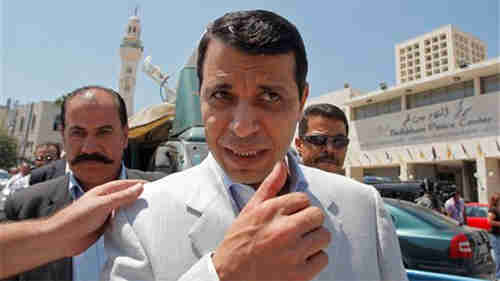 |
The 81-year-old Mahmoud Abbas, who took over as leader of the Palestinian Authority (PA) in January 2005, after the death of Yassir Arafat, was overwhelming reelected as leader of Fatah/PA, which governs the West Bank, on Tuesday, after ruthlessly shutting out his principal opponent, 55-year-old Mohammed Dahlan, and Dahlan's supporters.
Abbas's victory isn't a surprise, but it wasn't the outcome that the so-call "Arab quartet" -- United Arab Emirates (UAE), Egypt, Saudi Arabia and Jordan -- had hoped for. Much of the Arab world has been waiting for Abbas to retire or die, so that a younger leader like Dahlan could replace him.
Abbas, born in 1935, is part of the old generation of survivors of the genocidal war between Jews and Arabs that followed the 1947 partitioning of Palestine and the creation of the state of Israel. When Yasser Arafat died in December 2004, Abbas was a natural choice to succeed him, because they were both war survivors and shared a common world view. But now the time is approaching for a successor and for a generational change.
The major aspirant is 55 year old Mohammed Dahlan. Dahlan grew up poor in a Gaza refugee camp, but as a top aide to Arafat became Gaza's strongman in the 1990s, jailing leaders of rival Hamas which was trying to derail Arafat’s negotiation with Israel through bombing and shooting attacks. Abbas and Dahlan used to be allies, but the 2008 war between Fatah and Hamas, that made Hamas the governing power in Gaza caused tension between them, until 2011 when Abbas expelled Dahlan completely from Fatah.
The population of the West Bank is badly split between supporters of Abbas and Dahlan. Abbas, as a survivor of the bloody 1947-48 war, has devoted much of his life to achieving some kind of political solution to the conflict with Israel -- namely the so-called "two-state solution" with Israel and Palestine existing side by side in peace -- a "solution" that can only be described as delusional.
Supporters of Dahlan are generally much more belligerent, and are ready to go to war with Israel. Dahlan and his supporters are in the generations that grew up after the 1947-48, and have no personal memory of its horrors, and so is not afraid to see that war repeated.
The youngest generations of Palestinians, as far as I can tell, are pretty much disgusted with all the Palestinian leadership. This is the so-called "Oslo generation," kids growing up after the 1993 Oslo accords that were supposed to bring peace to the Mideast, but in fact are perceived as having accomplished nothing. They see the so-called "Mideast peace process" as nothing more than a failed series of humiliations for Palestinians.
There has apparently been one change in the last year. In 2015, there was a spate of knife attacks on Israelis by 15-25 year old boys in the Oslo generation of Palestinians. Those knife attacks have not been in the news in a long time, and so apparently have run their course. Al-Monitor and Israel National News and Middle East Eye
Related Articles
Ever since Hamas's stunning victory of Fatah/Palestinian Authority in 2006, which permitted Hamas to eject Fatah from Gaza, the two governments have seemed to hate each other more than they hate Israel.
There have been several attempts to form a "unity government" between the two entities. The most recent attempt followed the 31-day Gaza war between Israel and Hamas, which Israel won. After the war, there was enormous pressure from Arab states for Hamas and Fatah to unify into a single government. The United Nations General Assembly had created the nation "Palestine" in 2012, but it didn't make sense to have a state of Palestine, if the Palestinians had two separate governments in conflict with each other.
They did form a unity government in June 2014, but it was unity in name only. They never did function as a single government, and Abbas dissolved it in June 2015 over a disagreement about money.
However, hopes have arisen again of a unity government, after Hamas chief Khaled Mashaal said in a speech earlier this month that a reconciliation should be tried:
"It is time we reconsider the organization [Fatah/PA]. ... In order to build our lives and political system on democratic foundations, we must be partners in shouldering responsibility and partners in the decision of war and peace. ...The wager on the diplomatic movement on its own has been proven a failure. Let us agree on a national strategy and that everyone is with the [armed] resistance, which is a legitimate right that raises the cost of the occupation."
The last sentence affirms that Hamas expects to continuing using violence against Israel, to end Israel's "occupation" of land in the Mideast and Israel's existence.
There's good reason to doubt that the West Bank and Gaza Palestinian populations can ever be unified into a single government. The two Palestinian territories have been separated for several decades, and so the two cultures have grown in separate directions. Times of Israel (2-Nov) and Israel National News (26-Apr-2015)
Related Articles
(Comments: For reader comments, questions and discussion, see the 30-Nov-16 World View -- Mahmoud Abbas, 81, reelected leader of Fatah/Palestinian Authority thread of the Generational Dynamics forum. Comments may be
posted anonymously.)
(30-Nov-2016)
Permanent Link
Receive daily World View columns by e-mail
Donate to Generational Dynamics via PayPal
Tens of thousands flee from northern Burma across border to China
by John J. Xenakis
This morning's key headlines from GenerationalDynamics.com
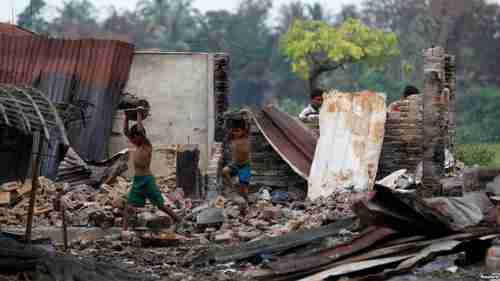 |
As we've been reporting, Human Rights Watch has posted satellite images that show that villages of Rohingya Muslims are being systematically burned down. Myanmar officials are making the laughable claim that the Rohingyas are burning down their own homes to embarrass the government, but it's pretty widely believed that it's being done Myanmar soldiers and security forces.
Myanmar officials are refusing to allow any aid agencies, international investigative agencies or reporters to enter the area to determine who is burning down the villages. However, eyewitness reports have been coming out, and John McKissick, head of the United Nations refugee agency (UNHCR) in the Bangladeshi border town of Cox's Bazar says that Myanmar troops are "killing men, shooting them, slaughtering children, raping women, burning and looting houses, forcing these people to cross the river" into Bangladesh. Other UN officials are saying that the Myanmar government actions are "ethnic cleansing."
This is all completely believable in view of the history of the past few years. In 2012 and 2013, Buddhist monks in Burma have been leading genocidal attacks on Rohingyas, in violation of the precepts of the Buddhism religion. In one attack, large mobs with hundreds of Buddhists attacked Muslims with knives and sticks.
The attacks have been led by Buddhist monk Ashin Wirathu and his "969 movement," where 969 is a historic Buddhist sign, referring to the nine qualities of Buddha, the six qualities of Buddha's teaching, and nine qualities of the Buddhist community. 969 is supposed to promote peace and happiness, although Wirathu's 969 movement is a vehicle promoting violence. And now the Burma's army is apparently taking over the movement with ethnic cleansing.
From the point of view of Generational Dynamics, this is a classic, historical act of genocidal extermination of one group targeting another. In this generational Crisis era, we're going to see more of these -- Hindu vs Muslim in Kashmir, Sunni vs Shia in the Mideast, reminiscent of Hutus vs Tutsis in 1994 Rwanda, Christian vs Jew in World War II or French vs English in the Hundred Years War, or Protestant vs Catholic in European wars of the past. AFP and The Hindu and Al Jazeera
Related Articles
Thousands of desperate Rohingyas from Burma's Rakhine state, threatened with ethnic cleansing by Burma's soldiers, have been fleeing into Bangladesh in the past two weeks, either walking across the border or by boat across the Bay of Bengal.
However, Bangladesh has ignored international appeals, and is refusing them entry, and has turned boatloads of refugees back, forcing them to return to Burma. Bangladesh's foreign ministry has confirmed that thousands of Rohingya have already sought refuge in the country, while thousands more are reportedly gathering on the border.
Those defending Bangladesh's policy point out that there are millions of Rohingyas living in Rakhine state, and if Bangladesh completely opened the border, then the surge of fleeing refugees would be overwhelming. VOA and BBC and Al Jazeera
Related Articles
Burma has a completely separate problem with other ethnic groups in the north -- the Kachin Independence Army, the Ta’ang National Liberation Army, and Kokang’s Myanmar National Democratic Alliance Army. As I recently reported, these groups are continuing decades' long fights with Burma's army, and tens of thousands of residents from the region are fleeing across the border into China to escape the violence.
China has put its army on high alert along the border, and is reinforcing its troops on the border with military trucks, tanks, heavy weapons and machine guns. China says that it is willing to play a "constructive role" in helping Myanmar resolve the problem, but no one knows whether that would mean that under some circumstances China's military would cross the border into Myanmar.
From the point of view of Generational Dynamics, Burma is an extremely difficult country to analyze because there are so many different ethnic groups fighting with and against each other. Following World War II, Burma experienced a series of extremely bloody crisis civil wars that only climaxed in 1958 when the army took over power. There has been sporadic fighting among these groups in the decades since then, but nothing that has escalated into a major war. Of the 15 armed ethnic groups in Burma, only eight were willing to sign a peace agreement at a recent signing ceremony.
A major research project is needed for Burma. The objective would be to analyze all Burma's ethnic groups individually, and develop generational timelines for each of them. Any historian with knowledge or love of Burma will find this a rewarding project. Burma News International and CCTV (China) and VOA
Related Articles
(Comments: For reader comments, questions and discussion, see the 29-Nov-16 World View -- UN: Burma (Myanmar) committing 'ethnic cleansing' of Rohingyas thread of the Generational Dynamics forum. Comments may be
posted anonymously.)
(29-Nov-2016)
Permanent Link
Receive daily World View columns by e-mail
Donate to Generational Dynamics via PayPal
The chaotic operation to liberate Mosul
by John J. Xenakis
This morning's key headlines from GenerationalDynamics.com
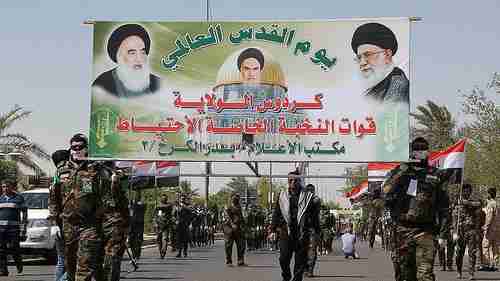 |
Iraq's parliament on Saturday voted overwhelmingly to allow Iran-backed Shia militias to take part in the military operation to recapture Mosul from the so-called Islamic State (IS or ISIS or ISIL or Daesh).
The vote was apparently 208 to zero. That's because all the Sunni lawmakers boycotted the vote in protest, while all the Shia lawmakers voted overwhelmingly in favor. The parliament has 328 seats.
Mosul is a city of close to a million people, mostly Sunni Muslims. They're well aware that Shia militias are accused of atrocities committed against Sunni residents of towns that Shia militias have previously liberated from ISIS. According to a January report by Human Rights Watch:
"Members of Shia militias, who the Iraqi government has included among its state forces, abducted and killed scores of Sunni residents in a central Iraq town and demolished Sunni homes, stores, and mosques following January 11, 2016 bombings claimed by the extremist group Islamic State, also known as ISIS. None of those responsible have been brought to justice."
For this reason, Turkey has predicted a sectarian war if Shia militias are part of the force sent to liberate Mosul, and has demanded that the Iraqi army alone liberate Mosul, a condition to which Iraq has previously agreed. But now Iraq has apparently reneged on that commitment.
Mosul is a historically Sunni city and was part of the Ottoman empire, and any attempt to change is demographic composition would be a direct threat to Turkey's security. The concern is that the population would be diluted by Kurds or by Shia Muslims coming from Iran. Turkey would consider that to be a threat to its security. Middle East Monitor and AP and Human Rights Watch (31-Jan-2016) and NRT TV (Kurdish)
Related Articles
BBC news reporter Richard Galpin last week drove to the front line in Mosul along with one of the Iraqi army's top generals Najim al-Jibouri. Here are some excerpts from his report:
"On the way there we saw that Shia militias, not the Iraqi army, were manning checkpoints in areas taken back from the IS militants.The militias have a controversial history. Some have been accused in the past of committing atrocities against Sunni Muslims. Now they're an integral part of the offensive on Mosul, which is a majority Sunni Muslim city - although they have been told not to enter the city.
Also taking part in the offensive are Kurdish troops, the Peshmerga, who've also agreed to stay out of Mosul to avoid inflaming ethnic tensions. And then there are Christian militias and some Sunni tribesmen.
While this complex mix of vested interests is currently bonded by the common goal of destroying IS in Iraq, it could fracture once that goal is achieved. For now though the focus remains on regaining the momentum of the offensive as elite troops try to push forward towards the center of Mosul.
It is heavy going - the IS leadership has had two years to prepare for this battle. And it's widely believed to have former Iraqi army and intelligence officers in its ranks, with the skills and knowledge to exploit the advantage of defending a city of narrow streets and with as many as a million people still living there. So far they've been using a stream of suicide bombers along with well-trained snipers to pin down the Iraqi special forces pushing forward street by street.
The troops are taking a lot of casualties and there are reports they don't have the back-up they need from units of the regular army which have not yet moved inside the city.
It was never going to be easy to dislodge Islamic State from Mosul, but unless the militants suddenly collapse or cut and run, it looks like it is going to be a long, costly battle."
Iraq's government has been bragging that the Iraqi army is going to strike a blow that will defeat ISIS in Mosul very quickly. Galpin's point was that Iraq's government is wrong, and also that nobody knows what's going to happen, except that it will take a long time.
A web site reader posted the following comment with regard to the situation in Syria: "I like to think I'm well-read and a capable reader. I don't have a clue as to who's doing what to whom and with what friends. How I wish America could afford to ignore this rabid dog fight, but we best not. Trouble is, who has enough mental acuity to keep all these abbreviations and their cloud-of-dust punch-ups straight in their minds? I surely don't."
This is an interesting observation, because it illustrates what an early and confusing stage the Mideast war is at, before it's completely clear who is fighting whom. When you think of WW II, you think of huge armies and navies from Germany, Japan, Russia, Britain, the US, and so forth. But the Mideast wars haven't yet reached that state. You have small tribes and militias fighting each other in what might be called "mini-wars" -- whether in Syria, Iraq, Yemen or Libya. National governments are trying their best to stay out of these mini-wars, except to provide weapons or money. Iran and Saudi Arabia are on opposite sides of wars in Syria, Iraq and Yemen, but one cannot at this time say that Iran and Saudi Arabia are at war.
In this generational Crisis era, that situation can't last forever. New generations of nationalistic, xenophobic young men are growing up in tribes and villages all over the Mideast. They're fighting each other in these mini-wars, but the number and ferocity of the mini-wars is growing. At some point, the Saudis will do something that the Iranians believe requires retaliation, or vice-versa, or maybe it will start with Pakistan versus India, or China versus Vietnam.
So what's going to happen in Mosul? If the Shia militias enter Mosul, will they liberate the Sunni residents or will they commit atrocities again, as they have in the past? Will Turkey decide to intervene to protect its interests in Mosul and protect the Turkmen citizens? Will that draw in more Iranian forces?
The fact is that nobody has a clue what's going to happen. This is an "organic" situation where you have lots of tribal and ethnic groups. There are commanders directing each of the small groups, but there's nobody running the whole show. Nobody knows what's going to happen, because all these groups are increasingly nationalistic, and even they don't know what they're going to do.
The good news is that, for the time being, these mini-wars don't affect us (unless you have friends or family in the region). The bad news is that these mini-wars are going to coalesce and become larger, and other nations will be forced to choose which side they want to be on. And then there will be a full-scale Mideast war -- Sunni versus Shia, Arab versus Jew, and ethnic group versus ethnic group. BBC and Reuters
Related Articles
(Comments: For reader comments, questions and discussion, see the 28-Nov-16 World View -- Iraq sending Shia militias to Mosul, directly violating promise to Turkey thread of the Generational Dynamics forum. Comments may be
posted anonymously.)
(28-Nov-2016)
Permanent Link
Receive daily World View columns by e-mail
Donate to Generational Dynamics via PayPal
Egypt rejects its former benefactor, Saudi Arabia, in favor of Russia and Iran
by John J. Xenakis
This morning's key headlines from GenerationalDynamics.com
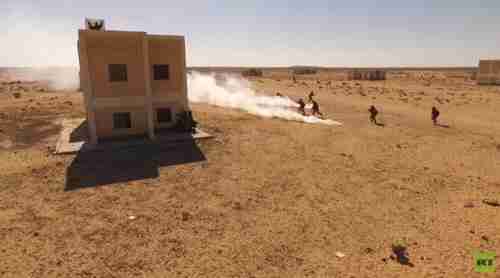 |
In a new Mideast realignment, Egypt's president Abdel al-Fattah al-Sisi has said in an interview that that he's officially backing the regime of Syria's president Bashar al-Assad.
The Mideast Sunni countries used to be allies of Bashar al-Assad, but turned against him when he unleashed his army and air force against peaceful protesters in 2011. Things really turned around in August 2011, when al-Assad launched a massive military assault on a large, peaceful Palestinian refugee camp in Latakia, filled with tens of thousands of women and children Palestinians. That massive assault turned Syria's civil war into the beginning of a regional sectarian war.
Shia forces from Iran and Lebanon's Hezbollah actively joined al-Assad to fight Sunni militias. Young Sunni jihadists from over 80 countries traveled to Syria to fight against al-Assad, and formed the so-called Islamic State (IS or ISIS or ISIL or Daesh). Other Sunni forces, including those from Turkey and Saudi Arabia, turned against al-Assad, and began supporting "moderate" Syrian Sunni rebels, including the Free Syrian Army (FSA).
And it's exactly the rise of ISIS that apparently has motivated this realignment by al-Sisi. Egypt has been targeted by numerous terror attacks, especially in Sinai by the terror group called Ansar Bayt al-Maqdis (ABM - Ansar Jerusalem - Champions of Jerusalem), which changed its name to Al Wilayat Sinai (Province of Sinai) when it changed its allegiance from al-Qaeda to ISIS in 2015.
According to al-Sisi:
"[Al-Assad's forces are] best positioned to combat terrorism and restore stability [in Syria]. Our priority is to support national armies, for example in Libya to exert control over Libya territory and deal with extremist elements. The same with Syria and Iraq."
Some analysts are suggesting that al-Sisi's statement of support is purely political, or only symbolic. But in fact reports indicate that al-Sisi is committed militarily as well. Several reports have indicated that al-Sisi has sent Egyptian helicopters and pilots to Syria to take part in the fighting, and that he plans to send a large deployment of Egyptian troops to Syria in January. Al-Sisi apparently believes that the best way for Egypt to fight ISIS in Egypt is to fight ISIS in Syria. Jerusalem Post and Middle East Monitor and Debka
Related Articles
Mohammed Morsi was elected president of Egypt in 2012, along with his Muslim Brotherhood government, and quickly assumed dictatorial powers. Qatar was a big supporter of the Muslim Brotherhood, and provided a great deal of aid to Egypt when Morsi was in power. In July 2013 al-Sisi, then an army general, overthrew Morsi in a coup. That aid ended with the coup, and the slack was taken up by Saudi Arabia, United Arab Emirates (UAE) and Kuwait.
Saudi Arabia has tried to play a mediating role between Egypt on the one hand and Qatar and Turkey on the other hand, and has continued supplying aid. But with the fall in oil prices, Saudi's economy has been in trouble, and Egypt's economy has become desperate.
Russia has promised large investments in Egypt, and recently committed investing $11.6 billion to build up Egypt's Suez Canal industrial zone. In return, Egypt is allowing Russia to conduct joint Egyptian-Russian military drills on Egyptian territory. There have been reports that Egypt would permit a Russian airbase on Egyptian soil, but those reports have been denied.
I always like to use the phrase "forced to choose" when analyzing situations like this. Generational Dynamics predicts that the Mideast is heading for a major war pitting Sunnis against Shias, Israelis against Arabs, and different ethnic groups against each other. When Egypt is forced to choose whether to side with Iran or with Saudi Arabia in the war, which side will it choose?
The situation is completely unclear, because the choice will be made not by al-Sisi but by the Egyptian people. And the Egyptian people are deeply split between loyalty to the Muslim Brotherhood and loyalty to a secular democracy. Al-Sisi is not as bad a genocidal monster and Bashar al-Assad, who has tortured, jailed, displaced or killed tens of millions of people, but he has tortured, jailed, displaced or killed tens of thousands of people, making the value of Egypt's secular democracy questionable. I do not believe that Egypt's people, when forced to choose, will choose Iran over Saudi Arabia, but I do consider it possible that there will be a split, and that part of the regional war will be a civil war among Egyptians, at least between the Egyptians in Cairo and the Bedouins in Sinai. Russia Today and ABNA (Shia) and Economist and Russia Today (19-Oct)
Related Articles
(Comments: For reader comments, questions and discussion, see the 27-Nov-16 World View -- Egypt to send troops to Syria to aid Bashar al-Assad and Russia thread of the Generational Dynamics forum. Comments may be
posted anonymously.)
(27-Nov-2016)
Permanent Link
Receive daily World View columns by e-mail
Donate to Generational Dynamics via PayPal
Syrian airstrike on Turkish forces threatens wider war
by John J. Xenakis
This morning's key headlines from GenerationalDynamics.com
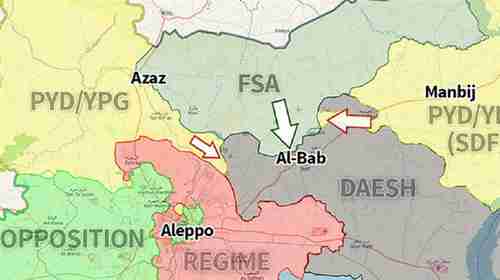 |
In August, Turkey began "Operation Euphrates Shield," and became the first Nato member to invade Syria since the beginning of the war that began in 2011. Turkey has stated that there are two objectives -- to fight the so-called Islamic State / of Iraq and Syria (IS or ISIS or ISIL or Daesh) and force them to move south, and to fight Kurdish People’s Protection Units (YPG), and force them to move back east across the Euphrates River.
The main ground force in Operation Euphrates Shield is the Free Syrian Army (FSA), backed by Turkish supplies and air power. Turkey's next two objectives are to recapture the city of al-Bab from ISIS, and to recapture the city of Manbij from the YPG.
As FSA militias move south towards al-Bab, it seems that a major confrontation is developing. YPG forces are also moving towards al-Bab to capture al-Bab from ISIS.
If Turkey-backed FSA forces take control of al-Bab, then the FSA forces will be in a position to help break the siege in eastern Aleppo, a city that the Syrian regime of Bashar al-Assad want destroy, killing over 250,000 people, mostly innocent women and children. Al-Assad has received worldwide condemnation for regime actions in Aleppo as war crimes and crimes against humanity, so al-Assad does not want to be stopped by the Free Syrian Army.
At the same time, FSA forces plan to move east and recapture Manbij from the Kurds.
Turkey's Retired Lt. Gen. Ismail Hakki Pekin summarized the plans for the Turkish Armed Forces (TSK):
"Operation Euphrates Shield was necessary, especially for TSK-backed Free Syrian Army (FSA) fighters, to prevent the establishment of a corridor [by terrorist PYD] near Kobani and the Afrin region. However, the operation must expand further south toward Manbij. Foremost, the operation must continue toward al-Bab before it moves toward Manbij, in order to prevent the corridor from being established to the south."
Operation Euphrates Shield appears to have slowed down substantially near the al-Bab region. Retired military officer and security specialist Abdullah Agar said that it's supposed to slow down because it's proceeding with caution:
"It was already known that the operation would become more difficult as it deepened and moved farther south. Al-Bab is the major obstacle that we are facing today. … [The PYD and its armed wing the People's Protection Units] YPG, the PKK, Syria's Assad regime as well as the Shiite militias have diverging plans regarding al-Bab. While the YPG-PKK hastens efforts to connect the Afrin region with the area west of the Euphrates, it also tries to seize regions that were cleared of Daesh. The[Syrian] regime is trying to further enhance its influence over Aleppo and surrounding region at the same time."
Daily Sabah (Ankara) and AP and Rudaw (Kurdish)
Related Articles
Air strikes killed four Turkish soldiers in the region around al-Bab on Thursday.
Thursday was November 24, the one-year anniversary of the day when Turkey's air force shot down a Russian jet along the Syria-Turkey border. This caused a major break in relations between the two countries, but there's been an uneasy reconciliation since Turkey's president Recep Tayyip Erdogan apologized.
Nonetheless, Erdogan suspected that Russia's president Vladimir Putin had ordered Thursday's airstrike in retaliation for last year's shootdown. Russia reassured Turkey that the airstrike was not carried out by them, and later notified Turkish officials that the attack was conducted by a Syrian air force Albatross plane.
The fact that a Syrian regime warplane attacked Turkish forces near al-Bab indicates the potential explosiveness of the situation. Any repeat of such an airstrike is almost certain to provoke Turkish retaliation on Syrian targets. Turkey has already threatened to retaliate for Thursday's strike, though the nature of that retaliation has not been specified.
Erdogan and Putin had a phone discussion over the incident. Little is known about what was said, except the usual vacuous statements issued by both sides. Erdogan reportedly told Putin that Turkey respected Syria's territorial integrity and that its military incursion showed its determination to fight militant groups. Putin reportedly said that the discussion on Syria was constructive and that both sides agreed to continue active dialogue to coordinate efforts against international terrorism. Blah, blah, blah. Undoubtedly, Turkey's invasion of Syria presents problems for Russia, who is the main sponsor of Bashar al-Assad.
According to Russian analyst Vladimir Sotnikov:
"What happened in northern Syria is highly dangerous, potentially for Russia too. President Erdogan is a violent and ambitious politician, sometimes acting on his emotions. If he decides that the strike on Turkish forces in Syria was not a mistake or a chance event, but a deliberate action by the Syrian command, he might take this as a challenge to himself. Then, as precedence dictates, it will be necessary to respond.Such a response [in case Erdogan decides to use air forces] threatens to drag Turkey into war with Russia over who controls Syrian airspace."
Some Russian analysts are speculating that Bashar al-Assad ordered the airstrike on Turkish forces in order to provoke a war between Russia and Turkey. Hurriyet (Ankara) and Daily Sabah (Ankara) and Hurriyet and Kommersant (Moscow)
Related Articles
(Comments: For reader comments, questions and discussion, see the 26-Nov-16 World View -- Turkey, Syria, Kurds, ISIS converge on a major military confrontation in al-Bab thread of the Generational Dynamics forum. Comments may be
posted anonymously.)
(26-Nov-2016)
Permanent Link
Receive daily World View columns by e-mail
Donate to Generational Dynamics via PayPal
Terrorist car bomb in southern Turkey kills two
by John J. Xenakis
This morning's key headlines from GenerationalDynamics.com
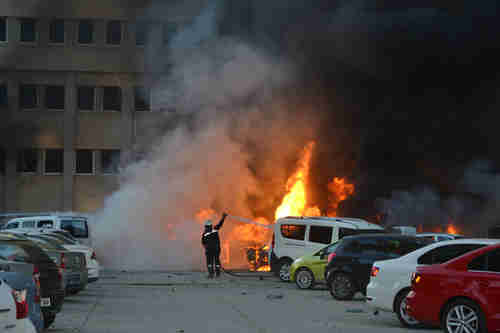 |
A terrorist car bomb attack on Thursday on a government building in the city of Adana in southern Turkey killed at least two people and wounded dozens of others. The bomber fled in another vehicle, but was captured after police opened fire on the vehicle.
There was no immediate claim of responsibility for the attack, but Turkey has suffered numerous terrorist attacks in the last year, perpetrated either by Kurdistan Workers’ Party (PKK), which is recognized as a terror group by Turkey, the US and the EU or by the so-called Islamic State (IS or ISIS or ISIL or Daesh).
Turkey responded with air force warplanes that destroyed a number of PKK targets in southeastern Diyarbakir province in Turkey, the PKK stronghold. Turkey's military said that six PKK members were killed, and that Turkish soldiers seized weapons and explosive substances in a warehouse following the airstrikes.
In addition to being targeted by numerous terror attacks, Turkey was targeted by an attempted army coup with tanks and jet fighters on July 15 that left 246 people dead and more than 2,000 wounded.
The seeming endless bombings and other attacks on Turkey have increased nationalist feelings and increased the popularity of president Recep Tayyip Erdogan. Daily Sabah (Ankara) and Middle East Eye and AP
Related Articles
The European Union parliament on Thursday voted overwhelmingly to call for an end to EU's talks with Turkey to join the EU. The vote is non-binding, and may be ignored by the people in Brussels who are negotiating with Turkey.
Despite the symbolic nature of the vote, it has infuriated Turkish officials and people, who see a European Union not only unsympathetic to the coup attempt and repeated bloody terrorist attacks -- all of which they believe would be completely intolerable to Europeans if the same things occurred on EU soil -- but as even more sympathetic to the coup plotters and terrorists than to Turkey.
Despite the coup attempt and terrorist violence in Turkey, many Europeans have been appalled at the massive purge that Turkey's president Recep Tayyip Erdogan has been pursuing -- arresting around 150 journalists, detaining more than 2,300 judges and prosecutors, suspending or dismissing almost 130,000 public employees, and arresting Kurdish members of parliament, accusing them of supporting the PKK. And many people point to the fact that Erdogan shut down the country's largest news organization, Zaman Media, months before the coup attempt.
There has always been a fairly high level of mutual xenophobia between Europeans and Turkey, some of it dating back to the days of the Ottoman Empire. The negotiations for Turkey to join the European Union, which began over ten years ago, have only increased the mutual xenophobia, as the EU made set one condition after another that the Turks considered unreasonable.
Within the last few weeks, Erdogan has suggested that Turkey might reinstate the death penalty, which was lifted in 2003 as one of the EU's conditions. Reinstating the death penalty would certainly kill any chance of Turkey joining the EU, and Thursday's symbolic vote by the European parliament may be considered a warning shot.
The EU needs Turkey as an ally for many reasons. One reason is the EU-Turkey refugee deal, which has cut the number of Syrian, Iraqi and Afghan refugees entering the EU by around 90%. That deal is now hanging by a thread. Another reason is that the US and Nato need Turkey's Incirlik air base for air operations in Syria.
Long-time readers are aware that Generational Dynamics predicts that in the coming Clash of Civilizations world war, the US will be allied with India, Russia and Iran, while China will be allied with Pakistan and the Sunni Muslim states, including Turkey. This prediction seemed fanciful when I wrote about ten years ago, but we've seen it come true step by step. The Barack Obama administration has been cozying up to Iran, and now the Donald Trump administration appears poised to cozy up to Russia. In the meantime, countries like Saudi Arabia and Turkey, which used to be close allies, have become increasingly distant from and hostile to the US. So the trend lines continue to move in the direction of the ten-year-old prediction. Daily Sabah (Ankara) and VOA and Daily Sabah and Russia Today and Daily Sabah
Related Articles
(Comments: For reader comments, questions and discussion, see the 25-Nov-16 World View -- Turkey furious at EU parliament's vote to end accession talks thread of the Generational Dynamics forum. Comments may be
posted anonymously.)
(25-Nov-2016)
Permanent Link
Receive daily World View columns by e-mail
Donate to Generational Dynamics via PayPal
The Pilgrims meet the Wampanoag Indians
by John J. Xenakis
This morning's key headlines from GenerationalDynamics.com
 |
In the year 1600, throughout what is now the United States, it's estimated that there were some 2 million Indians within 600 tribes speaking 500 languages. What happened, starting at that time, was a "clash of civilizations" between European culture of the colonists and the indigenous culture of the Indians. These cultures were so different that haven't yet merged even today, inasmuch as many Indian tribes still live separately on reservations. It's ironic that the American "melting pot" has merged so many cultures, but has not yet entirely merged the preexisting Native American cultures.
As with all tribes and ethnic groups in all places around the world, there were undoubtedly many brutal wars among the 600 tribes of the time. If there had never been any colonists, then the Indian tribes would have fought wars of extermination with each other, and probably today there would be one major tribe that was running the entire country, with other smaller tribes marginalized and discriminated against, perhaps even in reservations.
In this story, we're going to focus on just one Indian tribes: The Wampanoag tribe that occupied what is now southeastern Massachusetts (where Plymouth Rock is).
There is some historical evidence that there was a major war among the Wampanoag tribe and the Narragansett tribe that occupied what is now Rhode Island, and the Mohawk tribe (part of the Iroquois) of upstate New York. This war occurred in the years preceding the colonists' arrival at Plymouth Rock, probably in the 1590s. The Wampanoag and the Narragansett tribes were particularly devastated and weakened by that conflict.
So, when the pilgrims arrived at Plymouth Rock in 1620, in the midst of the Wampanoag tribe during a generational Awakening era (like America in the 1960-70s), the Indians were still war-weary, and were quite friendly to the pilgrims. There were even some Indians who, astonishingly, spoke English because they had been kidnapped by an English sea captain and sold into slavery, but escaped in London. One of them, Squanto, helped the pilgrims learn to hunt, fish and survive.
The pilgrims, led by Governor William Bradford, and the Wampanoags, led by chief Massasoit, developed a warm relationship. In November 1621, after the successful corn harvest, they celebrated with a feast now remembered as "America's First Thanksgiving."
Thanksgiving has been celebrated annually since then, and in 1863, President Abraham Lincoln made it a national holiday.
The Pilgrims were committed to have nothing to do with the English King and parliament. They had signed the Mayflower Compact, where they agreed that they would be governed by the will of the majority. They could provide for themselves, and they were friendly with the Indians.
This friendliness extended to trade. Before long, there was a mutually beneficial financial arrangement between the Indians and the colonists. The colonists acted as intermediaries through whom the Indians developed a thriving business selling furs and pelts to the English and European markets, and they used the considerable money they earned to purchase imported manufactured goods.
By the 1660s, the Wampanoag tribal society had entered a generational Crisis era, and relationships between the colonists and the Indians began to deteriorate.
William Bradford had died in 1657, and Massasoit died in 1661. The personal ties between these leaders had vanished, and younger generations of colonists and Indians rose to power with personal friendships replaced by mutual xenophobia.
A generational Crisis era is usually accompanied by a major financial crisis -- that's certainly true in the world today. Things really began to turn sour in the 1660s because styles and fashions changed in England and in Europe. Suddenly, furs and pelts went out of style, and the major source of revenue for the Indians almost disappeared. This resulted in a financial crisis for the Indians, and for the colonists as well, since they were the intermediaries in sales to the Indians. Then and now, a financial crisis only feeds into and increases xenophobia, racism and nationalism, as different societies, races and nations blame each other for the financial crisis.
Massasoit was replaced as Wampanoag chief by his youngest son, Metacomet, who was nicknamed "King Philip" by the colonists. Relations between King Philip and the colonists worsened, and things came to a head in 1671, when King Philip himself was tried for a series of Indian hostilities, and required by the court to surrender all of his arms. He complied by surrendering only a portion of them.
Relations continued to deteriorate, and King Philip's War began in 1675, with Philip's attack on the colonists on Cape Cod. The war was extremely savage and engulfed the Indians and the colonists from Rhode Island to Maine. There were atrocities on both sides, and the war ended with King Philip's head displayed on stick. His wife and child were sold into slavery.
This was the most devastating war in American history on a percentage basis, with 800 of the 52,000 colonists killed. (It was devastating for the Indians as well.)
After the devastating war, people began to ask: Why weren't English soldiers here to defend us?
That brings us back to the Mayflower Compact, signed in 1620, which guaranteed that local government would be independent of the English Crown. The colonists had thought they would build their new community without outside interference, with their own rules and their own self-government.
After the devastation of King Philip's war, they felt forced to acquiesce completely to English rule. All home rule was dissolved and Governors would be appointed from London. British troops would protect the colonists from the Indians and the French, and colonists would pay taxes to the Crown in return.
Anyone who was around during America's generational Awakening era of the 1960s and 1970s will recall the "televangelists" -- people like Herbert W. Armstrong, Jim and Tammy Faye Bakker, Jerry Falwell, Jimmy Swaggart, Pat Robertson, Oral Roberts, and dozens of others.
A similar thing happened in the 1730s-40s. Historians have named this period "The Great Awakening in American history," and in fact the phrase "generational Awakening era" was derived from this historical name.
Just as America's youthful Boomers were rebelling against their parents in the 1960s, the colonists' young generations in the 1730s were rebelling against everything English, including the Church of England, known as the Anglican Church in the colonies.
The issue of government by the English Crown was a divisive issue at that time. The older generations had ceded power to London in return for the protection of the English army. The younger generations rebelled against giving all this power to the Crown.
The Anglican Church never did have much success in establishing religious control in the colonies, as congregations of Puritans, Presbyterians, Congregationalists, Baptists, Quakers and many other religions sprang up in the colonies from the beginning, and had to compete with one another for followers.
Starting in the 1730s, something brand new came about -- something we recognize today in the form of "televangelists." Various preachers went from city to city, telling thousands of rapt listeners that they would be punished for their sinfulness, but could be saved by the mercy of an all-powerful God. To take one example, John Wesley, born in 1703, created the Methodist religion, and traveled on horseback throughout the country for years, stopping along the way to preach three or four sermons each day.
The Great Awakening of the 1730s and 1740s was not just a religious revival; it was also an act of rebellion against the older generation that favored control by the British in return for protection. By rejecting the Anglican Church, the young colonists were symbolically rejecting British control.
All the contradictions and compromises that were forced upon the colonists following the devastation of King Philip's War came to a head in the Revolutionary War. In particular, the taxes that England had levied against the colonies to pay for protection from the Indians and the French led to colonist demands for "No taxation without representation!", the catchphrase for pre-Revolutionary days.
By the 1760s, the British were moving to consolidate their control over America as a British colony. In particular, the Sugar Act and Currency Act of 1764 were imposed in order to prevent the colonies from trading with any foreign country except through England as an intermediary. The Stamp Act of 1765 was enacted to recover at least a fraction of the money England had to spend to maintain its military forces in the colonies.
These moves by England hardly seem unreasonable. The colonies were expensive children, and like a parent expecting his children to pay a little rent, England had a right to expect the colonists to pay for a portion of the cost of protecting them.
But the pressure for revolution had been building for a long time. The Stamp Act was particularly galling. All printed documents, including newspapers, broadsides and even legal documents, had to have a stamp affixed, with the cost of the stamp being paid to England.
An underground terrorist group called the Sons of Liberty was formed. This group used violence to terrorize Stamp Act agents and British traders in numerous towns. However, violence was rare: colonial opposition was designed to be non-violent. The colonies formed a "Stamp Act congress" to call for repeal. English imports were boycotted. The English sought to contain the problem and compromise. As a result, the Stamp Act was repealed by 1766.
However, England was still trying to find a way to collect revenue from the colonies without engendering riots, but they never succeeded. In 1767, England passed the Townshend Acts, imposing further taxes on goods imported to the colonies. Four more years of increasingly virulent protests forced England to repeal the taxes in 1771.
There's no question that England was doing everything it could to compromise and contain the situation. When occasional violence broke out, it was contained. In the most well-known incident, the 1770 Boston Massacre, where British soldiers fired into a crowd and killed five colonists, two of the soldiers were tried and convicted, and tensions were relieved again.
By 1771, all taxes had been repealed except a tax on importation of tea, and even that tax was often evaded. From a purely objective view, the colonists really had few major grievances at this time.
However, a financial crisis occurred in July 1772, when the English banking system suffered a major crash. Many colonial businesses were in debt to the English banks, and were suddenly unable to obtain further credit, forcing them to liquidate their inventories, thus ending their businesses.
In May 1773, The English Parliament passed a new Tea Act, and in December 1773, a group of Boston activists dumped 342 casks of English tea into Boston Harbor.
The Boston Tea Party can hardly be called a major act of violence. Tea was expensive, of course, but 342 casks of English tea shouldn't have been something to cause a war.
Nonetheless, the Boston Tea Party, has become world famous. It was so electrifying at the time that it surprised and shocked both the colonies and England. After that, one provocation after another on both sides finally led to war.
The furious English Parliament passed a series of "Coercive Acts" to dismantle the colonial Massachusetts government, close the port of Boston, and control the hostilities. This was tantamount to a declaration of war. With positions on both sides becoming increasingly hardened, war was not far off.
Hostilities actually began in April 1775, when the colonial minutemen attacked the British forces following the midnight ride of Paul Revere. The separation became official on July 4, 1776, when the Continental Congress endorsed the Declaration of Independence.
The war continued until November 30, 1782, when American and British representatives signed a peace agreement recognizing American independence.
The end of the Revolutionary War didn't mean the end of the American crisis. There were still grave doubts as to whether the Union could survive. The colonies had formed a very weak Confederation, which left each former colony largely autonomous, adopting its own currencies, taxes, laws and rules. The economy suffered a major recession in 1786, resulting in severe acts of terrorism by bankrupt farmers and businessmen -- acts that couldn't be controlled since the terrorists could not be pursued across state lines because there was no federal army. The crisis did not end until 1790, after the Constitution was ratified and George Washington became president.
A generational crisis war is so horrific that the survivors, both the winners and losers, are willing to make compromises to make sure that nothing like it happens again. The survivors of King Philip's War had agreed to a compromise that allowed Britain to rule the colonies and collect taxes in return for the protection of the British army. That compromise became the issue that led to the next crisis war, the Revolutionary War.
The Revolutionary War was also resolved with a major compromise -- one that permitted slavery to exist in the South, though it was made illegal in the Northern states. The slavery compromise was necessary to create the nation in the first place. But it was also the seed that grew into the issue that almost destroyed the nation in the next generational crisis war -- the American Civil War.
Note: This material was adapted from Chapter 2 of my book, Generational Dynamics - Forecasting America's Destiny, which is available as a free PDF from my download page, http://generationaldynamics.com/download
(Comments: For reader comments, questions and discussion, see the 24-Nov-16 World View -- How the First Thanksgiving led to American independence thread of the Generational Dynamics forum. Comments may be
posted anonymously.)
(24-Nov-2016)
Permanent Link
Receive daily World View columns by e-mail
Donate to Generational Dynamics via PayPal
Activists call for independence of English-speaking Cameroon
by John J. Xenakis
This morning's key headlines from GenerationalDynamics.com
 |
Reports indicate that there was at least one death on Monday in clashes between English-speaking (Anglophone) protesters and police, during protests of discrimination and marginalization by the French-speaking (Francophone) majority.
Thousands of Anglophone Cameroonians brought coffins to protests to the city of Bamenda, proclaiming that they were ready to die and be burned in their coffins. Security forces fired tear gas and live bullets to disperse the demonstrators. The amount of violence has been a surprise, causing some to worry of a government crackdown leading to genocide. The 1994 Rwanda genocide is in the minds of the Cameroon people, as it is in the minds of all Africans.
Monday's demonstrations were by Anglophone teachers who were protesting that the government was deploying Francophone teachers teach the French language in Anglophone areas of Cameroon.
The teachers' demonstrations followed demonstrations by Anglophone lawyers in Bamenda two weeks ago to protest that the legal and court systems are biased toward Francophones, with many laws passed without even being translated into English. That demonstration was dispersed by security forces using tear gas. Cameroon Concord and Radio France Internationale (RFI) and International Business Times (London)
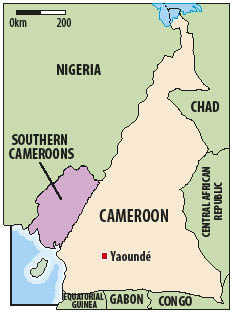 |
In the 15th century, Portuguese explorers named the area near the mouth of the Wouri River the Rio dos Camaroes (River of Prawns) after the abundant shrimp in the water. Over time the designation became Cameroon in English. This is the only instance where a country is named afer a crustacean.
During the "Scramble for Africa" in the late 1800s, Cameroon became a colony of Germany. However, during World War I, Britain and France forced Germany out of the territory, and created two regions, British Cameroon and French Cameroon.
The war for independence began in 1955 in French Cameroon. Independence was won in 1960, with the Republic of Cameroon.
In 1961 British Cameroon, under a referendum sponsored by the United Nations, was given the choice of joining either Nigeria or the Republic of Cameroon. There was a split with the Northern part of British Cameroon voting to join Nigeria, and the Southern part voting to join the French speaking Cameroon. Overall, the latter won the referendum. The former British Cameroon is now known as the "Southern Cameroons" region of Cameroon, and is home to about 3.2 million English-speaking people. This month's riots and demonstrations took place in Bamenda, a city of 500,000, and the largest city in Southern Cameroons.
During the generational Awakening era that followed, a separatist movement called the Cameroon Anglophone Movement began in 1984. The Southern Cameroons region is adjacent to the Biafra region of Nigeria, and some activists would like to join the two into an independent country. Of course, this is opposed by both the Cameroon and Nigeria governments. International Business Times (27-Feb-2016) and Jacob Crawfurd (Copenhagen) and Nebafuh (activist) and CIA World Factbook
Related Articles
(Comments: For reader comments, questions and discussion, see the 23-Nov-16 World View -- Cameroon: One person killed in English-speaking vs French-speaking civil unrest thread of the Generational Dynamics forum. Comments may be
posted anonymously.)
(23-Nov-2016)
Permanent Link
Receive daily World View columns by e-mail
Donate to Generational Dynamics via PayPal
Burma's army appears to be exterminating Rakhine State Rohingyas
by John J. Xenakis
This morning's key headlines from GenerationalDynamics.com
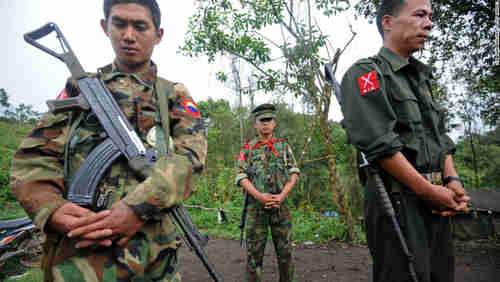 |
In October of last year, the government of Myanmar (Burma) concluded a peace agreement with its armed ethnic groups that had been under negotiation since 2011. According to the government rhetoric, the agreement was "bringing hope" that the entire country would soon be "at peace."
However, of the 15 armed ethnic groups in Burma, only eight attended the lavish signing ceremony and signed the agreement. The others indicated that they wished to continue fighting Burma's army.
Now three of the non-signers have launched a series of violent attacks on military outposts and police stations across the northern part of the country. Hundreds of people have been forced to flee their homes, some crossing the border into China. The groups are:
The conflicts have resulted in a central part of the country dominated by the majority Burmese, surrounded by various ethnic minority populations who form the majority in their own areas. Most of Myanmar’s ethnic groups are now concentrated within particular regions corresponding more or less to the states named after the seven ethnic nationalities: Karen, Kachin, Mon, Arakanese, Karenni, Chin and Shan.
China's defense ministry issued a statement saying, "The Chinese army is on high alert and will take the necessary measures to safeguard the country's sovereignty and safety, as well as protect the lives and property of Chinese citizens living along the border."
China has not intervened in the Burma conflicts, but might do so if Chinese citizens, in either Burma or China, were threatened. There have at least nine deaths and dozens of wounded.
Following World War II, Burma experienced a series of extremely bloody crisis civil wars that only climaxed in 1958 when the army took over power. There has been sporadic fighting among these groups in the decades since then, but nothing that has escalated into a major war.
But now, 58 years after the climax of the last generational crisis war, Burma is entering a new generational Crisis era. 58 years is the point where the generations of survivors of the last crisis war lose enough of their power (through death or retirement) so that they can no longer influence events enough to prevent a new generational crisis war, and so a major new war could break out now or at any time in the future. South China Morning Post and International Business Times and Radio Free Asia
Related Articles
As we recently reported, Burma's army is conducting a scorched earth attack on Rohingya Muslims in Rakhine state. As of a week ago, over 430 buildings had been burned down. Now, Human Rights Watch has released new satellite photos showing that 1,000 homes have been burned down, almost all in Rohingya villages, many of which no longer exist. Dozens of people have been killed, and at least 300,000 people have been forced to leave their homes, with many fleeing into Bangladesh. Witnesses and alleged victims also accused soldiers of widespread rape.
Burma's government has completely closed off the entire region, refusing to allow reporters or investigators to see for themselves what has happened. Furthermore, the government is saying that thousands of Rohingyas have burned down their own homes. I must admit, Dear Reader, that hearing crap like this from government officials really infuriates me. But it's what we've come to expect from leaders like Bashar al-Assad, Vladimir Putin, Robert Mugabe, and Pierre Nkurunziza. AFP and BBC and Deutsche Welle
Related Articles
(Comments: For reader comments, questions and discussion, see the 22-Nov-16 World View -- China puts army on high alert along border with Burma (Myanmar) thread of the Generational Dynamics forum. Comments may be
posted anonymously.)
(22-Nov-2016)
Permanent Link
Receive daily World View columns by e-mail
Donate to Generational Dynamics via PayPal
Tribal warfare in southern Libya could destabilize all of Libya
by John J. Xenakis
This morning's key headlines from GenerationalDynamics.com
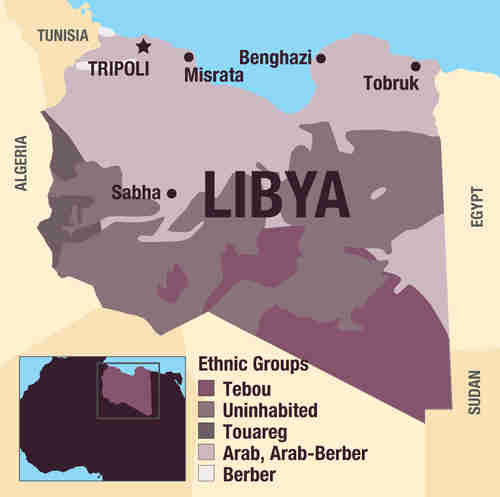 |
Clashes between two rival tribes in Sabha in southern Libya, killing dozens of people and wounding over 100, was triggered by a bizarre incident involving a monkey.
A monkey belonging a shopkeeper attacked a group of schoolgirls passing by, bit and scratched some, and pulled her headscarf off one girl's head. The shopkeeper was from the Gaddadfa tribe, which is the tribe of former Libyan dictator Muammar al-Gaddafi.
The schoolgirls are from the Awlad Suleiman tribe. After the incident, men from the Awlad Suleiman tribe killed the monkey and three people from the Gaddadfa tribe, the shopkeeper and his family according to some reports.
Fighting then escalated between the two tribes to involve tanks, mortars, shells and rockets, and has continued for several days. By Sunday there were still sporadic clashes.
During the 2011 Libyan war that resulted in the overthrow and death of Muammar al-Gaddafi, Sabha was the heart of al-Gaddafi's support base, which consisted mainly of the Gaddadfa tribe in Jabha and Sirte, as well as the Warfalla and Merghara tribes from other regions. Al-Araby and Information Nigeria
The region around Sabha is heavily populated by two Arab tribes, the Gaddadfa tribe and the Awlad Suleiman tribe. Also in the region are two non-Arab nomadic Berber ethnic minorities, the Tuareg and Tubu tribes, that are spread across Africa from Libya to the Algeria.
Muammar Gaddafi was successful in manipulating these tribes to his own advance, but since their disappearance there has been a power struggle, leading to frequent outbreaks of violence across Libya’s south. Groups are competing to control borders, strategic assets (such as energy infrastructure and roads), and the formal and informal economy.
The main tensions are between the Arab (Gaddadfa, Awlad Suleiman) and non-Arab (Tuareg, Tubu) tribes. The non-Arab tribes generally have much darker skin than the Arab tribes, and were discriminated against by the Arabs when al-Gaddafi was in power. Since his overthrow, and the end of many border controls, the non-Arab tribes have been moving into other areas, causing increased tensions with the Arab tribes, with clashes erupting among and between the Arab and non-Arab tribes.
The media have been focusing mainly on northern Libya, including cities like Tripoli and Benghazi. But a war among tribes in the south could quickly spread to the north, and even to other countries. Al-Araby (24-Nov-2015) and West Point Combating Terrorism Center (10-Dec-2014)
Related Articles
(Comments: For reader comments, questions and discussion, see the 21-Nov-16 World View -- Bizarre monkey attack triggers tribal war in Jabha in southern Libya thread of the Generational Dynamics forum. Comments may be
posted anonymously.)
(21-Nov-2016)
Permanent Link
Receive daily World View columns by e-mail
Donate to Generational Dynamics via PayPal
Sri Lanka says that '32 élite, well-educated Muslims' have joined ISIS in Syria
by John J. Xenakis
This morning's key headlines from GenerationalDynamics.com
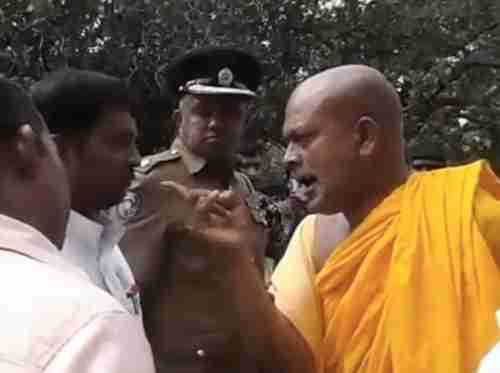 |
Sri Lanka's bloody generational crisis civil war between the market-dominant mostly Buddhist ethnic Sinhalese and the mostly Hindu ethnic Tamils ended in May 2009, and in the seven years since then, the country has been devoted to achieving reconciliation between the two ethnic groups.
So a number of people in both groups are alarmed at the sudden occurrences of racist hate speech by Buddhist monks against Tamils. One video that's gone viral shows a Buddhist monk using extreme racist expletives and abusive language to verbally assault and threaten a Tamil public servant, as a (presumably Sinhalese) uniformed police officer watched, without taking action.
In another incident, a Buddhist leader threatened a "bloodbath" in protest over the arrest of a self-proclaimed "Savior of the Sinhalese."
However, the racist attacks are apparently more ethnically than religiously motivated, as Christian Tamils are also being targeted, as well as Hindu Tamils and Muslim Tamils. More than 70 percent of Sri Lanka's 20 million people are Buddhists, about 13 percent are Hindu, while Muslims make up around 10 percent.
A joint civil society submission to the Committee on the Elimination of Racial Discrimination in August 2016 documented 132 incidents faced by Christians and 141 incidents against the Muslims, in a span of one year, since 2015. These incidents include attacks on places of religious worship, and minority religious communities being disrupted during times of worship and prayer. Even worse, no attempt has been made to prosecute the offenders.
According to Father S. J. Emmanuel, president of the Global Tamil Forum, the attacks are signs of increasing Sinhalese nationalism by Buddhist monks:
"While the Sri Lankan Constitution clearly guarantees all citizens the right to equality, non-discrimination and freedom of religion and religious worship, the number of attacks against religious and ethnic numerical minorities across Sri Lanka, by ethno-nationalist majoritarian groups, typically led by one or more Buddhist monks, remains unchecked. Civil society groups have consistently documented and reported such attacks to relevant authorities. However, charges have never been brought against the perpetrators, despite the conduct of these monks being in clear violation of hate-speech and anti-discrimination protections under Sri Lankan law."
Both Christian and Hindu Tamil groups have called on the government to bring to justice all those in violation of Sri Lanka’s anti-discrimination and hate-speech laws, including Buddhist monks. This is not very likely to happen.
Sri Lanka is in a generational Recovery era, following the end of the civil war. This is a period of austerity when rules and institutions are devised by the survivors of the civil war to make sure nothing like it ever happens again. These rules and institutions survive for several decades until the Unraveling era, when younger generations have come to power, and the generations that survived the war are no longer running things.
These racist attacks by Buddhist Sinhalese against Hindu and Christian Tamils are the first signs of what's to come in few years, when the first postwar generation comes of age, in the generational Awakening era. Sunday Leader (Colombo, Sri Lanka) and The Hindu (India) and The Island (Colombo)
Sri Lanka's justice minister Wijeyadasa Rajapakshe says that 32 Sri Lankan Muslim have traveled to Syria to join the so-called Islamic State (IS or ISIS or ISIL or Daesh). According to Rajapakshe:
"All these (Muslims) are not from ordinary families. These people are from the families which are considered as well-educated and élite.There is a greater fear among the public about ISIS. If somebody tries to spread extremism in this country, we will not allow for that from today. The law of this country is no different to Buddhist monks or ordinary people."
However, the Muslim Council of Sri Lanka (MCSL) strongly objected to this statement, saying that the referenced incidents occurred over a year ago:
"We strongly object to this misplaced statement. The facts given by the Minister were reported in the media more than a year ago when a Sri Lankan combatant died fighting with ISIS.There have been no new reports of any others getting involved since this was reported last year.
It is believed that one family had gone to Syria to provide humanitarian support to the war wounded and refugees. Some of the men are alleged to have joined or forced to join the fighting forces of ISIS. The Muslim community, including the Muslim Council, Jamiathul Ulema and other organizations cooperated with the government in identifying the families to provide the necessary support for the intelligence agencies to investigate."
According to the MCSL, Sri Lanka is unlike other countries in that Sri Lanka Muslims have been condemning un-Islamic comments by Muslims, and there are no madrassas "indoctrinating its children with fundamentalism."
This is entirely believable, and a credible contrast to Muslims in northern Africa, the Mideast and southeast Asia. All of those countries are in generational Crisis eras, with their last generational crisis war having been World War II or earlier, and so the popular mood in those countries is highly nationalistic and xenophobic toward non-Muslims or even Muslims in other branches (i.e., Sunni versus Shia).
But Sri Lanka is in a generational Recovery era, having just gone through an extremely bloody civil war that encompassed Buddhists, Hindus and Christians as well as Muslims. The population is war weary and eager to apply "lessons learned" from the civil war, creating laws and institutions to guarantee that no such horror will ever happen again. There will always be exceptions, but for the time being, Muslims in Sri Lanka are not jihadists and are not supportive of jihadists, as they are in the other 80 or so countries that sent young men and women to Syria to fight the genocidal actions of Bashar al-Assad. As years and decades go by, and new generations come of age, this attitude will change, of course, but right now there are few people who want to thwart the country's attempt at reconciliation. Reuters and New Indian Express
Related Articles
(Comments: For reader comments, questions and discussion, see the 20-Nov-16 World View -- Sri Lanka Sinhalese Buddhist monks accused of racist hate speech against Hindu Tamils thread of the Generational Dynamics forum. Comments may be
posted anonymously.)
(20-Nov-2016)
Permanent Link
Receive daily World View columns by e-mail
Donate to Generational Dynamics via PayPal
United Nations warns of mass atrocities in South Sudan
by John J. Xenakis
This morning's key headlines from GenerationalDynamics.com
 |
Japan has had peacekeeping troops from its Self-Defense Force (SDF) in South Sudan since 2012, but they were restricted to doing only one kind of thing -- rebuilding the country's infrastructure, such as roads and refugee camps. In particular, they were forbidden from taking part in any military operation of any kind, because Japan's pacifist constitution, written at the end of World War II, restricts military action to Japanese soil, and then only for self-defense from an invader.
Japan's prime minister Shinzo Abe has approved a change taking effect on November 20 that will deploy 350 SDF troops to South Sudan and allow them to engage in combat if they're attacked, or if other nations' peacekeepers are attacked.
This seems to be a relatively mild change in military orders, but in fact it's a major change in policy. Based on campaigning by Shinzo Abe, in 2015 Japan adopted new "collective self-defense" laws, partially departing from the pacifism in the constitution. The old self-defense clause of the constitution has been interpreted to permit military action only when Japan itself is being attacked, and only on Japanese soil. The new collective self-defense laws reinterpret the self-defense clause to include "collective self-defense," which would permit military action anywhere in the world under some circumstances when an ally (such as the United States) is attacked. I discussed the meaning of "collective self-defense" in detail in 2014 in "5-May-2014 World View -- Japan debates 'collective self-defense' to protect America and Japan".
The reinterpretation of the self-defense clause has been extremely divisive in Japan, and at the time it was passed it even resulted in some fists being thrown in the Diet (Japan's parliament). Abe said that the change was essential for the survival of Japan, while opponents say that approving the exercise of the right to collective self-defensive is a "slippery slope" that will keep expanding to permit additional non-defense military activity.
Opponents of the South Sudan deployment in Japan do indeed view the it as the first step on a slippery slope. According to an editorial in Japan Times:
"Possible use of weapons by the SDF troops in rescuing civilians under attack might trigger counterattacks by enemy forces, which could erupt into unexpected fighting. The chance of such developments cannot be ruled out in the extremely fluid security situation in South Sudan. The Abe administration may think that the new mandate, which will be given to the 350 Ground Self-Defense Force personnel to be dispatched there next month, will bring Japan’s peacekeeping mission closer to international standards. But the government should also be aware of, and be accountable for, what it could possibly entail."
Deutsche Welle and Japan Times and Asahi Shimbun (Tokyo) and The Diplomat
Related Articles
U.N. Secretary-General Ban Ki-moon is warning of a “very real risk of mass atrocities” in South Sudan and that peacekeepers deployed in the country will not be able to stop such a bloodbath. According to Ban, "There is a very real risk of mass atrocities being committed in South Sudan, particularly following the sharp rise in hate speech and ethnic incitement in recent weeks."
The mass atrocities are occurring as a result of renewed ethnic fighting between the Dinka tribe of president Salva Kiir and the Nuer tribe, led by former vice president Riek Machar. Kiir and Machar signed a peace agreement last year in August, but it fell apart several months ago.
The last generational crisis war between the Dinka and Nuer tribes climaxed in 1991 with the "Bor Massacre," in which hundreds of thousands of Dinkas in the Bor community were starved, displaced or killed by invading Nuer militias led by Machar. Thus, South Sudan is in a generational Awakening era, and there are many survivors of the Bor Massacre from both sides who do not want to see anything so horrible happen again, and will do anything they can to prevent it. So an event similar to the Bor Massacre will not occur, and Ban's concern about a new full-scale civil war are not realistic.
What we're seeing in South Sudan is a familiar pattern that I've described many times in countries like Syria, Burundi, Thailand, and Zimbabwe, starting 5-15 years after the climax of a generational ethnic crisis war. The leadership in the country, which represents one ethnic tribe or group, decides that in order to prevent a new civil war, it's necessary to impose "security" by having the security forces commit atrocities against the other ethnic group. AFP
Related Articles
(Comments: For reader comments, questions and discussion, see the 19-Nov-16 World View -- Japan's troops in South Sudan become first test of new 'collective self-defense' policy thread of the Generational Dynamics forum. Comments may be
posted anonymously.)
(19-Nov-2016)
Permanent Link
Receive daily World View columns by e-mail
Donate to Generational Dynamics via PayPal
Italy's Monte dei Paschi di Siena floats desperate rescue plan
by John J. Xenakis
This morning's key headlines from GenerationalDynamics.com
 |
As we've been reporting, Italy's Banco Monte dei Paschi di Siena (MPS), founded in 1472, and the world's oldest operating bank, is close to collapse because it has $55.2 billion of bad loans on its book. These bad loans are so bad that it's estimated that selling these bad loans to a third party would only get 20% of face value.
Because of these bad loans, somebody is going to have to lose a lot of money. It's illegal under EU rules for Italy's government to use taxpayer money to bail out the bank, since that simply transfers the financial crisis from the bank to the whole country, which would lead to an Italian financial crisis similar to Greece's financial crisis that we've been reporting for years.
The other choice is for those who invested in the bank, by purchasing either stock shares in the bank or bonds issued by the bank, will lose a substantial part of their investments. This might be considered an ideal solution in some circumstances, but it's a disaster in the case of Italy, since many bonds have been sold to ordinary people as a kind of high-interest savings account for those saving for retirement.
MPS is looking for a deal to save the bank from collapse, and is under a kind of deadline. Italy is holding a government reform referendum on December 4, and prime minister Matteo Renzi has said he'd resign if the referendum fails, which polls indicate is likely. That would create government crisis that would spook investors involved in any deal to bail MPS out.
So MPS is floating a last minute deal bondholders (including financial investors and ordinary people) to offer bank stock to holders of $4.6 billion in bank bonds. It's a great deal until you learn that the market value of MPS's stock is just $740 million, which isn't going to go very far in paying off bondholders.
However, bank officials see another sign of hope: Qatar's sovereign wealth fund, the Qatar Investment Authority, which reportedly holds $256 billion in assets, is said to be interested in investing in MPS. New Europe and Bloomberg and Market Mogul
Related Articles
European leaders were completely unprepared for the passage of the Brexit referendum and the election of Donald Trump, both the result of the rise of a younger generation demanding a change.
And now they're bracing for another jarring election result: The rejection by Italian voters on December 4 of a referendum to reform Italy's government. Prime minister Matteo Renzi claimed that the reform would make Italy's government more stable and efficient.
Renzi announced the referendum late last year when his personal popularity ratings were high, and he said that he would resign if the referendum didn't pass.
This promise probably made sense at the time, but has been disastrous in retrospect. Renzi's popularity has been falling, and the promise has energized his political opponents, particularly the left-wing populist Five Star Movement (M5S), led by Beppe Grillo, an Italian comedian, actor, and political activist. M5S received about one-quarter of the vote in the 2013 elections, has won some major mayoral elections since then, and has become increasingly popular.
Thanks to M5S's campaigning, it now appears more likely than not that the referendum will fail on December 4. Renzi has repeated his pledge that he would resign in that event. Structural problems that the referendum was supposed to fix will remain in place, and paralyze the government.
This would likely cause a loss in confidence in the government by financial investors, and possibly the collapse of the Monte dei Paschi di Siena bank, forcing the government to bail the bank out. This would be a violation of EU rules, and could force Italy to leave the eurozone, replacing the euro currency with its former national currency, the lira.
A lot of things have to happen before that scenario could unfold, and until recently it was thought impossible. But Brexit and the election of Donald Trump were also thought to be "impossible" until they happened, and now European leaders' nerves are rattled as they consider the possibility of a third major electoral shock in 2016. The Local - Italy and UPI and Economist and The Local - Italy
Related Articles
(Comments: For reader comments, questions and discussion, see the 18-Nov-16 World View -- After Brexit and Trump, Italy's Five-Star-Movement may be the next surprise thread of the Generational Dynamics forum. Comments may be
posted anonymously.)
(18-Nov-2016)
Permanent Link
Receive daily World View columns by e-mail
Donate to Generational Dynamics via PayPal
The 'science' of climate change
by John J. Xenakis
This morning's key headlines from GenerationalDynamics.com
 |
The surprise election victory of Donald Trump, who has called climate change "a hoax," has been an extremely unpleasant shock to African leaders attending a climate change conference in Marrakesh, Morocco. Prior to the election, they had hoped that the international climate change agreement would be a financial bonanza, and they angry now that they see all that money slipping away, and are concerned that the entire climate change effort may be near collapse.
A statement by United Nations Secretary-General Ban Ki-moon to the Marrakesh conference on Wednesday urged a rapid scale-up in funding for climate change programs, especially to support developing countries. "Finance and investment hold the key to achieving low-emissions and resilient societies," he said.
Many leaders are urging that implementation of the climate change agreement be sped up so that as much as possible can be done while president Barack Obama is still in office.
World Bank president, Jim Yong Kim, said that he's trying to mobilize as much as financing as possible."
"It is not just about trying to persuade donors and financiers to put up more money, although we are definitely trying to do that, but it also about creating the environment that crowds in a lot more financing. Even if we have the 100 billion dollars we are talking about, it is not nearly enough to reach our goals. ...We are trying to find ways to improve the way the existing banking sector understands and considers the risks of climate smart investments."
Kenya's president Uhuru Kenyatta said that the developed countries have an obligation to provide plenty of money to developing countries like Kenya:
"We should aim to ensure achievement of the long-term global goal of stabilizing the global temperature increase to below 1.5 degrees Celsius above the preindustrial levels, which gives hope to the most vulnerable countries and communities. ...The process should also take into consideration the obligations of developed country Parties to provide additional, predictable and sustainable support in terms of finance, technology and capacity building to meet the adaptation and mitigation needs of the developing country Parties."
One thing that we've learned over the years is that giving free money to African countries is mostly a disaster. After decades of giving huge amounts of aid to African countries, the people are just as poor and the infrastructure is little changes. Money given to an African leader is used to buy weapons, or to build a new glittering presidential palace, or to be deposited in a foreign bank account. United Nations and Capital FM (Nairobi) and The Hindu
As I've written in the past:
I'm not aware of any evidence to support the belief that any money spent on the basis of an international climate change agreement would not be completely wasted. BBC
Related Articles
(Comments: For reader comments, questions and discussion, see the 17-Nov-16 World View -- African nations furious over possible collapse of climate change agreement thread of the Generational Dynamics forum. Comments may be
posted anonymously.)
(17-Nov-2016)
Permanent Link
Receive daily World View columns by e-mail
Donate to Generational Dynamics via PayPal
Syria and Russia resume bombings of women and children in Aleppo
by John J. Xenakis
This morning's key headlines from GenerationalDynamics.com
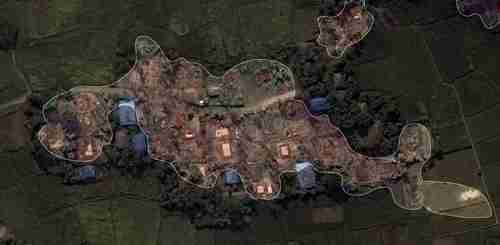 |
Fears are growing that Burma's army is conducting a scorched earth attack on Rohingya Muslims in northern Rakhine state, in revenge for the killing of nine army border guards in October by 20 militants.
Those attacks are believed to be in revenge for massive rounds of Buddhist attacks on Rohingya Muslims in 2012, including murders, rapes, and burning down villages, and for plans announced earlier this year by the government to demolish 12 mosques and 35 madrasas (religious schools) in Rakhine State because they had been built without permission.
Now satellite images published by Human Rights Watch show that Rohingya Muslim villages are again being burned down, but this time by the army. They troops had been sent to the region to prevent further violence, but instead they're conducting further violence. Over 430 buildings have been burned down.
Burma's government is denying that the troops had anything to do with the violence, and suggested that the Rohingyas had burned down their own homes to embarrass the government, a claim that's considered laughable. Burma's government is adamantly refusing to allow reporters or investigators into the area to determine what really happened.
Violence grew over the weekend increased as soldiers killed dozens of Rohingyas, and forced hundreds from their homes into already overcrowded camps.
Rohingya Muslims in Myanmar (Burma) had lived there for generations have been slaughtered and driven from their homes by Buddhists led by Buddhist monk Ashin Wirathu. The Rohingyas, described by the United Nations as "the most persecuted ethnic group in the world," are not even recognized as Rohingyas by Burma's government, who refer to them as Bangladeshis.
Following the massive attacks on Rohingyas by Buddhists, led by Buddhist monks, we're seeing tit-for-tat increases of violence on both sides. With Myanmar in a generational Crisis era, this is the kind of violence that leads to civil war. Human Rights Watch and Radio Free Asia and Frontier Myanmar
Staffan de Mistura, the United Nations envoy for Syria, there are 275,000 people living in east Aleppo, but only about 1,000 of them members of Jabhat al-Nusra (al-Nusra Front) which recently renamed itself Jabhat Fateh al-Sham (JFS) when it cut its ties to al-Qaeda.
But now the long-expected assault on east Aleppo is finally beginning, with the apparent objective of killing as many of the 275,000 people as possible. The new Russian naval war group, led by the Admiral Kuznetsov aircraft carrier, which has just arrived in at the coast of Syria, launched its first attacks today, sending warplanes and cruise missiles to east Aleppo, Homs and Idlib, while Syrian regime warplanes also pound Aleppo.
Syria's president Bashar al-Assad has been widely condemned in the West as a war criminal, using barrel bombs, Sarin gas, chlorine, ammonia, phosphorous, and other weapons on hospitals, schools and markets with no military objective except to kill as many innocent women and children as possible. Al-Assad continues in the delusional view that this will cause the residents to throw down their weapons and surrender, something that will never happen in Syria's generational Awakening era. AP and VOA
Related Articles
(Comments: For reader comments, questions and discussion, see the 16-Nov-16 World View -- Communal violence grows in Myanmar (Burma) between Buddhists and Rohingya Muslims thread of the Generational Dynamics forum. Comments may be
posted anonymously.)
(16-Nov-2016)
Permanent Link
Receive daily World View columns by e-mail
Donate to Generational Dynamics via PayPal
Expect tensions to increase in Poland and Romania
by John J. Xenakis
This morning's key headlines from GenerationalDynamics.com
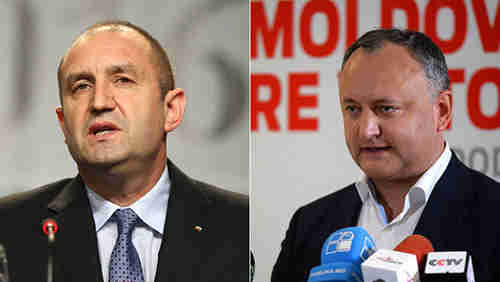 |
Bulgaria's prime minister resigned on Monday after it became clear that his party had lost badly in Sunday's presidential election. The pro-Moscow Socialist candidate Rumen Radev won an overwhelming 59.4% of the vote, compared to 36.2% for his center-right opponent.
Bulgaria is a member of the European Union, and is also a member of NATO, creating a potential political conflict with Russia. Radev has frequently stated his support to end the sanctions on Russia for invading and annexing Ukraine's Crimean peninsula, and this week he praised U.S. President-elect Donald Trump for "seeking more dialogue" with Russia's President Vladimir Putin.
Bulgaria is a mostly Orthodox Christian country in eastern Europe, on the border with Turkey. Like other east European countries, Bulgarian officials fear the consequences of the collapse of the EU-Turkey refugee deal, which would result in a massive new influx of refugees from Syria. As a result, Bulgaria is building a fence along its border with Turkey and Greece.
Bulgaria also has migrant troubles in the other direction. In 2014, Germany's Chancellor Angela Merkel is warning Britain's Prime Minister David Cameron that Britain might have to leave the European Union if Cameron insists on adopting quotas that would limit the number of migrant workers coming to Britain from eastern European countries, like Bulgaria, Poland and Romania. The irony is enormous. RFE/RL and EuroNews and Greek Reporter (11-Aug)
Related Articles
Socialist Party leader Igor Dodon won Moldova's presidential election on Sunday with 52.2% of the vote, after campaigning to pursue closer ties with Russia rather than the EU.
However, unlike the situation in Bulgaria, the opposing government is not resigning. The opposition leader Maia Sandu said that the elections were neither free nor fair. and accused opponents of using "dirty methods" against her.
Moldova's people are extremely polarized in the political conflict between the European Union and Russia. At the center of the conflict has been the secessionist and mainly Russian-speaking province of Transnistria (also called Trans-Dniester or Transdniester). Russia has thousands of troops stationed there, supposedly as peacekeepers. At the time of Russia's military invasion and annexation of Ukraine's Crimean peninsula, the people of Transnistria, which is on Ukraine's border, were expressing the hope that Russia's military would annex Transnistria as well.
In fact, Dodon is apparently prepared to grant Transnistria a special status, short of full secession:
"For the first time in the recent seven years, all the pro-Moldova and pro-state forces have united for friendship with Russia, for neutrality, for our Orthodoxy, for the unity of the country in settling the Transnistria conflict. The first step has been made. ..."My position remains unchanged," he continued. "We should grant a special status to Transnistria. ... I believe, the country’s federalization is the only solution."
On Monday, up to 3,000 mostly young Moldovans marched to the offices of the Central Election Committee in Chisinau, the country's capital city, shouting "Down with the Mafia!"
There are fears that a pro-Russian government in Chisinau will result in an expansion of Russian military forces in Moldova, and this would cause a hardening of relations with Ukraine and Romania, and indeed with the entire European Union. Al-Jazeera and Tass (Moscow) and RFE/RL
Related Articles
(Comments: For reader comments, questions and discussion, see the 15-Nov-16 World View -- Bulgaria and Moldova elect pro-Russian presidents, turning away from EU thread of the Generational Dynamics forum. Comments may be
posted anonymously.)
(15-Nov-2016)
Permanent Link
Receive daily World View columns by e-mail
Donate to Generational Dynamics via PayPal
Syrian regime sending 'leave or die' text messages to Aleppo residents
by John J. Xenakis
This morning's key headlines from GenerationalDynamics.com
 |
There have been plenty of recent stories about the financial collapse of Obamacare, and the astronomical increases in premiums -- something that I predicted would happen that day after it was announced in 2009, because it was a repeat of President Nixon's wage-price controls, which were supposed to lower the inflation rate from 4% to 2%, but instead increased it to 12%. The increases in Obamacare premiums are following the same pattern as Nixon's price controls, as I predicted. Obamacare is a true financial disaster.
However, it's been less reported that Britain's National Health Service (NHS) is also facing financial collapse.
As we reported a year ago, Britain's National Health Service (NHS) is facing an existential crisis, with a huge and accelerating deficit expected to reach 22 billion pounds ($32 billion) by 2020.
The system is deeply corrupt, with doctors falsifying records, claiming for work that was never done, or putting in for bogus overtime. Dentistry services are so bad that people are buying "do-it-yourself (DIY) dentistry kits" to take care of their whole families, as was done centuries ago.
New reports indicate that about half the hospitals will have bed cuts, and one-third will close their Accident & Emergency departments (known in America as Emergency Rooms). Many maternity units will also be targeted for closure.
The country has been split into 44 areas, with each told to produce proposals to balance the books and change the way care is delivered. The UK now has fewer beds for its population than almost any country in Europe. One quarter of hospital beds have been closed in the last decade, with 37,000 fewer general and acute beds now than in 2006/7, taking levels of hospital occupancy to a record high. Telegraph (London) and Guardian (London)
Related Articles
The long-expected mass slaughter of residents of east Aleppo by Russian and Syrian regime forces may finally be imminent, as the regime of Syria's president Bashar al-Assad is sending text messages to east Aleppo residents telling them to leave the area within 24 hours.
The text messages say the following:
"To the armed people in the neighburhoods of east Aleppo, we are giving you 24 hours only to decide if you are leaving. Your leadership abroad is incapable of getting you out. Whoever wants to stay alive must drop his weapons and we will secure his safety. After the 24 hours is up we will implement a strategic attack using highly sophisticated weapons.The opposition leadership that stays in hotels and castles enjoying a luxurious life doesn’t care about the poor Syrian citizens in east Aleppo. They are using you for their personal benefit. We are giving you, the sick and the wounded, 24 hours to exit if you want."
The use of text messages is a new tactic, as the regime has previously transmitted messages by dropping leaflets or using loudspeakers.
However, anti-government activists have told reporters that few people are actually reading the text messages, since there no electricity to charge mobile phones. Many believe that the text messages are no more than psychological warfare.
A new Russian naval war group, led by the Admiral Kuznetsov aircraft carrier, has just arrived in at the coast of Syria, preparing for battle. East Aleppo has about 250,000 residents, already starving, mostly women and children, and the al-Assad regime has indicated that it wants to kill as many of them as possible. Al-Jazeera and Telegraph (London)
Related Articles
(Comments: For reader comments, questions and discussion, see the 14-Nov-16 World View -- Britain's National Health Service (NHS) forced to close emergency rooms thread of the Generational Dynamics forum. Comments may be
posted anonymously.)
(14-Nov-2016)
Permanent Link
Receive daily World View columns by e-mail
Donate to Generational Dynamics via PayPal
14-year-old suicide bomber kills dozens in Sufi shrine in Pakistan
by John J. Xenakis
This morning's key headlines from GenerationalDynamics.com
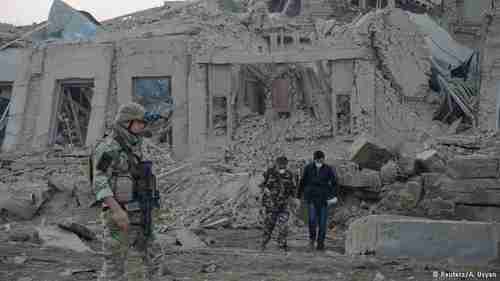 |
A suicide car bomber rammed Germany's consulate in Mazar-i-Sharif in northern Afghanistan on Friday, killing six civilians and wounding more than 120. The ensuing gun battle continued for around five hours. All German and Afghan employees of the consulate were unharmed. The Taliban claimed responsibility.
Germany's Foreign Minister Frank-Walter Steinmeier said, "The attackers were fought off by the consulate's security personnel, Afghan security forces, and German, Georgian, Belgian and Latvian special forces stationed in the city as part of the Resolute Support mission." Mazar-i-Sharif is the provincial capital and one of the richest and most important cities in Afghanistan. Deutsche-Welle and AP
A man wearing a suicide vest killed two U.S. service members and two U.S. contractors early Saturday inside Bagram military base, the largest NATO military base in Afghanistan. A Taliban spokesman claimed responsibility for the attack, and said it had been planned for four months.
Bagram Airfield features several layers of security, including retinal scans. The attacker was one of the Afghan laborers working on the base. NBC News and Arab Times (Kuwait)
At least 52 people were killed and over 100 wounded in a suicide bombing by a 14-year-old boy at a Sufi shrine about 760 km south of Quetta and 100 km north of Karachi in Pakistan's southwestern province Balochistan.
The bombing occurred just before sunset during a daily Sufi ritual trance-like dance or "dhamaal." Many people come each day just for the dance, including non-Muslims. At least 500 people had gathered on Saturday for the dance and for a picnic.
The so-called Islamic State (IS or ISIS or ISIL or Daesh) is claiming credit for the attack, giving rise to the speculation that the boy's parents have joined an ISIS-linked terror group in Pakistan. However, ISIS has the practice of claiming credit for terror attacks it's had nothing to do with, and that may be the case this time.
An attack occurred three weeks ago at a police training facility in Quetta, killing 61 people, mostly fresh police recruits. That attack was blamed on the Al Alami offshoot of Lashkar-e-Jhangvi (LeJ), a terror group that has vowed to exterminate all Shias in Pakistan, and has carried out numerous terrorist actions targeting Shias and Sufis. LeJ is also thought to have links to ISIS, and it's possible that Saturday's attack was linked to LeJ.
In August, Jamaat ul-Ahrar (JuA, Assembly of Freedom) claimed responsibility for another terror attack at Quetta's Civil Hospital, killing at least 75 people. JuA has also declared allegiance to ISIS.
Last month's Quetta attack sent shock waves through Pakistan's society, as they continue their internal debates between "good and bad Taliban," and this new attack will intensify that debate. Express Tribune (Pakistan) and Press Trust of India (PTI) and Smithsonian Magazine on Sufi dance
Related Articles
(Comments: For reader comments, questions and discussion, see the 13-Nov-16 World View -- Multiple terror bombings cross Pakistan and Afghanistan thread of the Generational Dynamics forum. Comments may be
posted anonymously.)
(13-Nov-2016)
Permanent Link
Receive daily World View columns by e-mail
Donate to Generational Dynamics via PayPal
Many wives face hardship because their 'hidden cash' is now worthless
by John J. Xenakis
This morning's key headlines from GenerationalDynamics.com
 |
In May of this year, India's government released a report on tax compliance for the first time in decades. According to the report, only about 1% of India's population paid taxes on their earnings in 2013. By contrast, the figure is 45% in the United States.
Here are some reasons for this:
India Today (2-May) and International Business Times (6-Jun-2013) and CNBC
India's rupee currency fell sharply against the dollar this week, after prime minister Narendra Modi announced on Wednesday that all notes 500 rupee and 1000 rupee notes (equivalent to about $7.50 and $15.00, respectively) would immediately become worthless, in the sense that they are no longer "legal tender," and can no longer be used for commerce. New 500-1000 notes with additional security features will be issued "soon."
A person with 500-1000 rupee notes can deposit them in his bank account until December 31. However, anyone depositing more than 250,000 rupees will have to account for the money, and will be subject to tax, a 200% penalty, and prosecution.
The term "black money" refers to money that has not been declared to the income tax department. Someone who deposits a sack full of cash can expect to get notices from the income tax department demanding an explanation of where this money came from. The person will be subject to a full audit, and required to submit personal books of accounts. The income tax department will be conducting unannounced raids to look for assets like gold and property papers.
India's government hopes that this desperate measure will bring in several billion dollars in additional tax revenue.
Hopefully, someone in India's government will realize that this will work only once because of its surprise value, and that in the future people will figure out new ways to avoid paying taxes. India Times and International Business Times and New Delhi TV
Many people kept their cash for daily living in the form of 500-1000 rupee notes, and suddenly their cash was worthless.
People flooded the banking system on Thursday and Friday to obtain cash, but the banks were unprepared and ran out of cash, causing people to wait in line for a long as ten hours. Even worse, many rural areas of India have no banks at all. Commercial currency exchange businesses around the world immediately stopped accepting the 500-1000 notes, leaving Indian people stranded in foreign countries with no money.
Women in India are hardest hit by the new policy, according to the BBC Hindi correspondent Shivani Kohawk(?). She explained the problems that women in India have (my transcription):
"Basically, women in India have traditionally tried to save money by stealing from their husbands, and this is something I was told to do when I got married. My cousins have done it, my mother's done it. What they do is when the man comes back home, after a hard day's work, he's always carrying some cash, and they try and sneak out a couple of hundreds, and put them away, and that's their way of keeping money aside, for things they might want to do which they're not allowed to do, as part of the family remit, or buy extra presents for their close friends and family, or just even to tide over a rainy day.And you will not believe it, but these sums can really really add up. And I think a lot of women now in India are wondering, oh my goodness, what should we do? How do we declare this so-called black money? That's one part of why Indian women would be holding on to cash.
There's also traditionally a culture of giving money as gifts, especially with weddings, close members of the family, instead of buying expensive presents would give you wads of cash, and the more affluent the relative, the bigger the sums of money, and as soon as the bride is done with all the wedding bonanza, she gets down to collecting her cash. And there she is, and obviously the more affluent the family, the bigger the sums. And again, this is her property. She holds onto it for her dear life. She doesn't give it to her husband.
The third thing that women do in India is called a Kitty Party. And what they do is - they get together and they pool in money. So you have a group of women, say, ten women, they all put 1000 rupees in, and at the end it there's ten thousands, and every month they'll meet, and one of them gets to take the 10,000 home."
She said that many women will be worried now that they have to deposit their "hidden money" into a bank. Special Broadcasting Service (Australia) and Canadian Broadcasting and International Business Times
Related Articles
(Comments: For reader comments, questions and discussion, see the 12-Nov-16 World View -- India's prime minister Narendra Modi declares 500-1000 rupee notes worthless thread of the Generational Dynamics forum. Comments may be
posted anonymously.)
(12-Nov-2016)
Permanent Link
Receive daily World View columns by e-mail
Donate to Generational Dynamics via PayPal
As winter approaches, Syria's east Aleppo faces mass starvation
by John J. Xenakis
This morning's key headlines from GenerationalDynamics.com
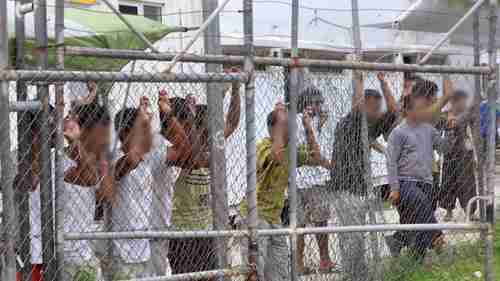 |
Reports indicate that Australia and the United States are close to a deal where about 1,800 migrants from Australian detention centers in Pacific islands will be resettled in the United States.
There have been reports for months that Australia was working on a deal to resettle the migrants in an unnamed country. It now appears that the unnamed country is the United States, and the deal was held up pending the US presidential election, so that it would not affect the election results. Now that the election is over, the deal can be completed and implemented in the presidential lame duck period.
In past years, thousands of refugees from Asia have traveled by boat to Australia, often after paying huge sums to human traffickers, hoping to resettle there. Australia has dealt with the situation, starting in 2001, by setting up two "detention centers" on Pacific islands, one on Papua New Guinea's (PNG's) Manus Island, and one on the island nation of Nauru, under agreements reached with both countries. Australia intercepts the boat people while at sea, and redirects them to the detention centers. These two filthy, rat-infested detention centers have been enormously controversial, with numerous stories of beatings, torture, and sexual abuse at the detention centers. The detention centers were shut down in 2007, but reinstated when the number of refugees and asylum seekers surged again into the thousands.
The detention center policy has been extremely successful, in that the number of migrants reaching Australia has been sharply reduced. However, the policy has been widely condemned as cruel to people fleeing poverty and violence, and as a violation of international laws.
Immigration department chief Michael Pezzullo refused on Friday to confirm that a deal is pending, but said "We are working actively on those arrangements ... today we are closer than what we were yesterday." He also refused to discuss which countries are in negotiations with Australia, but some reports indicate that Canada may be in negotiations as well. Special Broadcasting Service (Australia) and Sydney Morning Herald
Related Articles
With the regime of Syria's president Bashar al-Assad blocking food aid to east Aleppo, the UN aid agencies are will run out of food next week, and some 250,000 people will be facing mass starvation, with winter approaching.
Russia has been building for a massive military assault on east Aleppo, including more warplanes, and cruise missiles. Al Jazeera and BBC and VOA
Related Articles
(Comments: For reader comments, questions and discussion, see the 11-Nov-16 World View -- Hundreds of Australian migrants to be resettled in the United States thread of the Generational Dynamics forum. Comments may be
posted anonymously.)
(11-Nov-2016)
Permanent Link
Receive daily World View columns by e-mail
Donate to Generational Dynamics via PayPal
Is this the Apocalypse?
by John J. Xenakis
This morning's key headlines from GenerationalDynamics.com
 |
Two weeks ago, I wrote Clinton e-mail media storm shows sudden change in public mood after FBI Director James B. Comey made a Friday afternoon announcement that he might re-open the Clinton e-mail case. Friday afternoon announcements, including many previous announcements about Benghazi and Clinton e-mail dumps, are almost always immediately forgotten, but this one created a media storm in the mainstream media, indicating a sudden change in public mood.
As I wrote at the time, from the point of view of Generational Dynamics, the media storm was much more important than whether Clinton was guilty or innocent, because it indicated that the public mood was changing. And that media storm was a harbinger of the Trump victory which was a surprise to almost every media source and almost every polling organization.
Now Donald Trump has to govern. He's very similar to Barack Obama in that neither has the vaguest clue what's going on in the world. And after eight years in office, Obama seems to know as little today about what's going on in the world as he did eight years ago.
It remains to be seen whether Donald Trump will be any better at learning what's going on in the world than Barack Obama. Boomers are generally less arrogant and more willing to listen to reason than Gen-Xers, so there's hope.
One thing that his staff might do is develop some expertise in generational theory. Generational Dynamics is a non-ideological methodology that does analyses using MIT's System Dynamics applied to changes in generations. Since 2003, the http://GenerationalDynamics.com web site contains thousands of articles with hundreds of predictions, all of which have turned out to be right. There is no web site, analyst, politician or journalist with a success record in correct analyses and forecasts that comes even close to the Generational Dynamics success.
If the staff of Donald Trump, or any other politician in the country or the world, wants to base policy on what's actually going on in the world, rather than on fatuous left-wing or right-wing ideologies that are almost always wrong, then they should develop an understanding of generational theory, and read the daily World View articles.
Related Articles
As I've been writing for years, starting long before the current election, this is a generational Crisis era, and as in other Crisis eras, nationalism, racism and xenophobia have been increasing in countries around the world.
This trend illustrates why pollsters have been so wrong in both the Brexit referendum and the US elections. Pollsters were using models that date back to the 1990s, a generational Unraveling era when the Silent generation was still in charge, and knew the enormous dangers of nationalism, racism and xenophobia from having survived World War II. Polling organizations using 1990s models simply did not see the change in attitudes caused by the disappearance of the generations of survivors of World War II.
During the campaign, I was asked several times whether Generational Dynamics could predict the result of the election. The easy answer is that Chaos Theory proves that election results cannot be predicted, and any polling organization would agree.
For those who would like some additional technical details about this, I use a fairly simple test to determine whether or not something can be predicted.
When I want to decide whether something can or cannot be predicted, I use what I call "the butterfly test." You may have heard about the finding from Chaos Theory that a butterfly flapping its wings in China could start a chain reaction that might (or might not) cause a hurricane in North America. That's one reason why it's mathematically impossible to accurately predict the weather more than about two weeks in advance. No matter how advanced weather science becomes, whether forecasting will never be any better than it is now.
So I build on that concept. A butterfly flapping its wings in China could cause a hurricane in North America, and that could cause people to stay home, changing the outcome of an election. Since something as tiny as a butterfly flapping its wings could change the outcome of an election, there's no hope of predicting the outcome of an election. Or if you use polls to predict the results of an election, you likely have no better than a 50-50 or 55-45 chance of getting it right.
What generational theory does do is predict broad trends involving entire populations or entire generations. These trends can't be affected by a butterfly flapping its wings because there are too many people involved. People have free will, so you can't predict the actions of an individual or a small group of people, but you can predict many things about an entire population or an entire generation.
Almost everyone I know hated this presidential campaign, as the two candidates at times seemed to be in a race to be more sickening and disgusting than the other. How low could the country go?
Pollster Frank Luntz, appearing on 60 Minutes last Sunday, has been conducting political focus groups for years, and he traces the growth in political vitriol as starting in the 2000 presidential election, when Al Gore won the popular vote, but George W. Bush became president after six weeks and a Supreme Court decision. According to Luntz:
"And in that six weeks, we came from being Democrats and Republicans to being outraged, to believing that the other side is trying to steal the election. And when the election was over, there was no coming together. There was no honeymoon. And from that point on, the goal has been to delegitimize. Not to respect and at least to listen to, but to delegitimize the opposition. And now today in 2016, hours from now, it will be tens of millions of people who will believe that the loser should have won, that the election was rigged, and that the winner is illegitimate. ...I feel like I’m a child of a divorce. These two candidates, the way they fight, the way they yell at each other, the way they make it personal, it’s like having your parents get divorced, and you don’t want to live with either of them. And the judge sits there and says, “Pick one or the other.” And you say, “How about the jury? Can I-- can I go there?” It’s awful."
Luntz suggested that the "social media" is at fault. "There were people in that focus group who used language that if my mom was still alive and I said it, she would literally cut me out of the will. There’s no self-censoring. So we now say exactly what we feel. And, goddamn it, you’re gonna listen to me. And that’s really what it is right now. You’re gonna listen to me. I’m not gonna learn from you. You’re gonna listen to me."
Many people are hoping that the vitriolic attacks will end, now that the election is over, and that things can return to "normal." And when they say "normal," they mean the 1990s -- a generational Unraveling era. That's not going to happen.
The generational Crisis era ("Fourth Turning") officially began in 2003, 58 years after the end of World War II, as the last of the Silent generation retired. The vitriolic attacks on George Bush had begun a couple of years earlier, as Luntz described, but they've only become worse since then, and they've gone in both directions between Republicans and Democrats.
I titled this article "the honeymoon calm before the storm" as kind of a joke. New presidents are supposed to have a "honeymoon" that lasts 100 days or so into his new administration, but that was before the rise of Generation-X. Trump will be lucky if his "honeymoon" lasts the rest of this month.
This kind of chaotic storm always happens during a generational Crisis era. In the 1930s, President Franklin Roosevelt was deeply hated for many of his decisions. One of the worst was his decision to try to "pack" the Supreme Court by expanding it 15 judges, in order to get the court to stop declaring his favorite new laws unconstitutional. And you can imagine how vitriolic the attacks must have become when Roosevelt became the first US president to run for a third term.
The previous generational Crisis era saw the election in 1860 of Abraham Lincoln as president. This infuriated the Southern states, and led to the Civil War.
Many people are describing what's happening today as unique in American history. That's far from true. What's happening today happens in every country in every generational Crisis era. CBS 60 Minutes and History.com
Related Articles (58-year hypothesis)
I heard several journalists on the BBC and RFI on Wednesday talk about the end of the world, the Apocalypse. There were several reasons why the world was going to end. One was because Trump was going to end climate change talks, and we're all going to freeze to death ... I mean, burn to death. And the other was because Trump was going to start a nuclear war, and start dropping nuclear bombs on everyone. Nobody mentioned the Apocalypse caused by an attack by China.
This talk of Apocalypse is silly, but it's also not far from the truth. President Roosevelt's term led to World War II, and President Lincoln's term led to the Civil War. That's what happens during a generational Crisis era, no matter who's president.
As I've been writing for years, the world is headed for a new world war, the Clash of Civilizations world war. The allies of the West will include Japan, India, Russia and Iran. The enemies will be China, Pakistan, and the Sunni Muslim countries. This will be the greatest war in history. By the time it's over, every nuclear weapon in the world will have been used on someone. I estimate that the total deaths from nuclear war, ground war, famine and disease to be around 3-4 billion people, leaving around 4 billion people to rebuild the world.
And here's another little bit of irony. Assuming that this war begins during Donald Trump's term in office, and assuming that the United States survives the war, then Trump will become a national hero, with the stature of Roosevelt and Lincoln.
Related Articles
(Comments: For reader comments, questions and discussion, see the 10-Nov-16 World View -- Donald Trump: The honeymoon calm before the storm thread of the Generational Dynamics forum. Comments may be
posted anonymously.)
(10-Nov-2016)
Permanent Link
Receive daily World View columns by e-mail
Donate to Generational Dynamics via PayPal
Austria says EU must prepare for collapse of Turkey migrant deal
by John J. Xenakis
This morning's key headlines from GenerationalDynamics.com
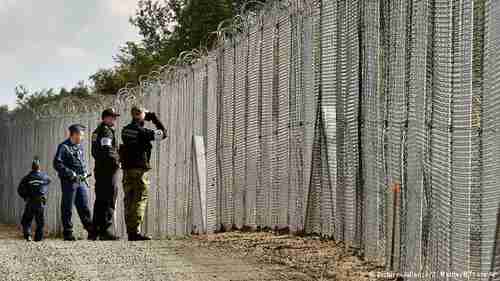 |
The European Commission on Tuesday will issue it annual report on Turkey's progress towards European Union membership, and the report is expected to be scathingly critical. According to media reports, it will criticize Turkey's crackdown on more than 110,000 judges, teachers, police and civil servants who have been fired or jailed. About 35,000 have been jailed after being accused, often with no evidence, of supporting the July 15 aborted coup attempt or of being a supporter of the Kurdistan Workers Party (PKK).
It will also reference the threat by Turkey's president Recep Tayyip Erdogan to reinstate the death penalty. This alone will end talks for Turkey to join the European Union. It could also mean the end of visa liberalization plans that would permit Turkey's citizens to travel freely in Europe without a visa.
European Commission President Jean-Claude Jüncker said the following:
"I note with bitterness, I who am a friend of Turkey, that Turkey is distancing itself from Europe every day. ... All that the Turkish authorities are doing today leads me to believe that in the end Turkey does not want to ... meet European standards. ...If tomorrow we refused visa liberalization for Turkey, the blame should not be put on Europe but on the Turkish authorities. Mr. Erdogan will have to explain to the Turks why they cannot travel freely across Europe like every other European, because he will be the one who has not fulfilled the conditions jointly agreed between Turkey and the European Union. ...
We need Turkey. But we cannot give up on our main principles."
In a speech on Sunday, Erdogan responded to accusations from the EU that he was becoming a dictator, and expressed contempt for the EU concern for human rights over the need to stop terrorism in Turkey:
"Europe has been on a course that is leading to its own demise.Those who are willing to drown the rest of the world in blood to preserve the sense of security and peace inside their own borders move further from humanity each day."
Erdogan has ridiculed the EU for having a weak policy for refugees, when Turkey has taken in at least 2.7 million Syrian refugees and houses 270,000 in 26 provisional refugee camps with food, health and education services as well as psychological support, vocational education and social activities, and has spent 7 billion euros meeting their needs.
The EU-Turkey migrant deal has been dramatically successful, reducing the number of migrants traveling across the Aegean Sea from Turkey to Greece to around a few dozen per day, down from thousands per day last year. However, the terms of that deal require visa liberalization, visa-free travel for all Turkish citizens in Europe's Schengen Zone, as well as billions of dollars in aid to Syrian refugees in Turkey. Those terms were to be met by June of this year, but they have not yet taken place.
Now Jean-Claude Jüncker is suggesting that visa liberalization will not occur at all. Turkish officials have repeatedly said that without visa liberalization, the EU-Turkey deal would be canceled, suggesting that once more there would be thousands of Syrian refugees per day crossing from Turkey to Greece.
The words between EU and Turkish officials have been getting increasingly vitriolic, but so far they're just words. Wednesday's EU progress report on Turkey could change things to stoking more nationalism in Turkey, but so far there are no signs that Turkey is really about to cancel the deal. Euro News and Reuters
Related Articles
Austria will meet next with the central European nations of the Visegrad group - Poland, Hungary, Slovakia and the Czech Republic - all of whom are opposed to the EU's migrant policy, to prepare for the collapse of the EU-Turkey migrant deal.
According to Hans Peter Doskozil, Austria's defense minister:
"I have always said that the EU-Turkey deal should only be a stop-gap measure until the EU is in the position to effectively protect its external borders and thereby stem the flow of migrants. The time to organize for that is ever closer."
Austria is calling for tougher border controls, and an end of aid to Turkey.
Austria's foreign minister Sebastian Kurz said that the EU must adopt a different policy:
"Over recent years Turkey has moved further and further away from the EU, but our policy has remained the same. That can’t work. What we need are clear consequences.In Turkey, opposition figures are being arrested, journalists are being persecuted, officials are being fired if they think differently and the return of the death penalty is being talked about.
[Stopping the funds] is the logical consequence ... It is quite clear that this money will not flow if Turkey does not stick to its side of the deal."
Other EU leaders are becoming using increasingly vitriolic words towards Turkey. Luxembourg’s foreign minister Jean Asselborn referred to Turkey's dismissal of civil servants and firing of academics:
"To put it bluntly, these are methods that were used during the Nazi era and that’s a really, really bad development ... that the EU simply cannot accept."
As I've been writing for years, in the approaching Clash of Civilizations world war, the US and the West will be allied with Japan, India, Russia and Iran, fighting against China, Pakistan, and the Sunni Muslim countries, including Turkey. Deutsche Welle and Hurriyet (Ankara) and EU Observer
Hungary's anti-immigrant prime minister Viktor Orbán suffered a setback on Tuesday when the the parliament rejected an anti-migrant bill in response to the European Union resettlement plan and a specific EU quota to allow a reported 1,294 refugees to relocate to Hungary.
The parliamentary rejection occurred because the MPs of the anti-immigrant Jobbik, which would have been expected to support the bill, abstained on the vote. Jobbik was objecting to a separate measure supported by Orbán that permitted any foreigner with $331,000 to settle in Hungary. According to Jobbik MP Marton Gyongyosi:
"We have said that of course we are against the resettlements to Hungary by Brussels and we are against migration quotas, but we are equally against migrants to Hungary who perhaps have €300,000 to spend. If you want to say 'No' to poor ones, you have to say 'No' to rich migrants."
This is Orbán's second recent setback. Orbán supported a divisive reference that was held on October 2 on the same subject. Of the 3.3 million people who voted, 98% supported the referendum. But the referendum failed anyway, according to Hungary's constitution, because only 40.4% of Hungary's voters voted, short of the required 50% threshold. Budapest Business Journal and CNN and BBC
Related Articles
(Comments: For reader comments, questions and discussion, see the 9-Nov-16 World View -- EU's expected scathing report on Turkey may scuttle refugee deal thread of the Generational Dynamics forum. Comments may be
posted anonymously.)
(9-Nov-2016)
Permanent Link
Receive daily World View columns by e-mail
Donate to Generational Dynamics via PayPal
Advice on traveling to China
by John J. Xenakis
This morning's key headlines from GenerationalDynamics.com
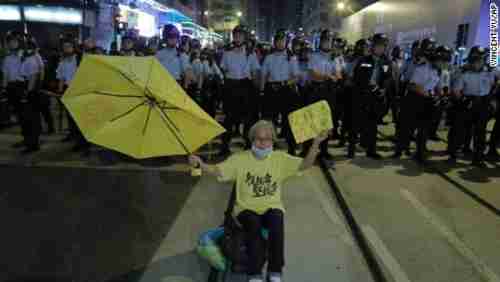 |
Mainland China has preempted Hong Kong's courts by ordering Hong Kong to "reinterpret" its laws so that the two pro-democracy "localists" who changed the wording of their oath of office will not be able to enter the legislature by taking the oath again.
China suffered a stinging defeat when a September 4 election gave pro-democracy or "localist" candidates 27 out of 70 seats in the Legislative Council of Hong Kong (LegCo). Two of those elected, Yau Wai-ching and Sixtus Baggio Leung Chun-hang, from "Youngspiration," went beyond "pro-democracy" to advocating full Hong Kong independence from China. When they took their oaths of office on October 12, they changed the wording of the official oath of office to express support for Hong Kong's independence. They also referred to China as "Chee-na," mimicking the derogatory Shina used by Japan during the second world war. The Hong Kong courts were asked to decide whether the two should be permitted to re-take their oaths, or be completely disqualified from entering LegCo.
On Monday, Beijing's National People's Congress (NPC) Standing Committee "reinterpreted" Hong Kong laws, essentially ordering the Hong Kong government to disqualify the two, and possibly others who have ever supported independence. The oath must be taken "sincerely and solemnly," and must "bear allegiance to the Hong Kong Special Administrative Region of the People' s Republic of China."
In addition, China may revive a long-dormant national security law that was dropped in the past. That law would provide legislation covering secession, subversion, theft of state secrets, and activities of foreign political organizations. Xinhua and South China Morning Post (Hong Kong) and Hong Kong Free Press and Bloomberg
Police in Hong Kong used pepper spray on Sunday to disperse 8,000 to 10,000 demonstrators protesting against the expected decision by Beijing to "reinterpret" Hong Kong laws. Some of the demonstrators used umbrellas to protect themselves from the pepper spray, as they had done during the 2014 demonstrations that launched the "umbrella revolution."
Hong Kong is deploying some 2,000 police officers around the clock this week, in preparation for further protests.
Several commentators have pointed out that Hong Kong politics has become more confrontational. In the past, when institutions were led by survivors of the bloody Communist Revolution, protestors saw peaceful protest as the best way to bring about change.
However, as survivor generations have died off, and radical new generations have come of age, protestors are argument that peaceful protests have achieved nothing, and that more confrontational tactics are required.
One can easily see that this won't end well. Hong Kong is only going to become more radicalized, and Beijing is only going to become more anxious and nationalistic. The same is true in Taiwan, and even in Tibet and Xinjiang. At some point, the Chinese Communist Party in Beijing will decide that enough is enough. South China Morning Post (Hong Kong) and BBC
Related Articles
Are you planning a trip to China? A number of Holly pros offer the following advice:
(Comments: For reader comments, questions and discussion, see the 8-Nov-16 World View -- China orders Hong Kong to disqualify anyone not taking 'sincere' loyalty oath to China thread of the Generational Dynamics forum. Comments may be
posted anonymously.)
(8-Nov-2016)
Permanent Link
Receive daily World View columns by e-mail
Donate to Generational Dynamics via PayPal
Is Syria's Bashar al-Assad a 'necessary evil'?
by John J. Xenakis
This morning's key headlines from GenerationalDynamics.com
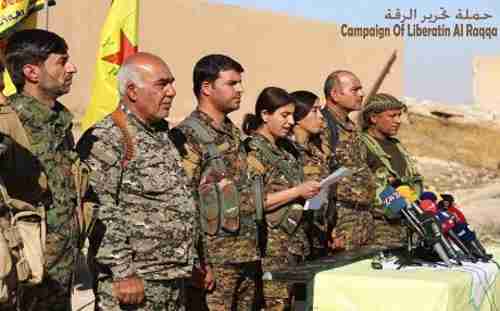 |
The Kurdish US-backed Syrian Democratic Forces (SDF) on Sunday announced the beginning of an operation to recapture Raqqa from the so-called Islamic State (IS or ISIS or ISIL or Daesh). Raqqa, a city of over 300,000 people, has served as the "capital city" for ISIS.
Different news reports of the operation are calling it by different, though similar names. The names I've seen so far are:
The announcement was a surprise, coming so soon after the beginning of the operation to recapture the city of Mosul in Iraq from ISIS. It's possible that the start of the operation was speeded up in order to give ISIS less time to prepare. However, both of the operations, in Raqqa and Mosul, are expected to take months, and to require bloody street to street fighting.
The announcement is also controversial because the principal fighters are Kurds, something that's opposed by Turkey and by many Arab Sunnis. The Kurds have treated Sunni Arabs harshly in other cities that the Kurds have liberated from ISIS, and have expelled many of the Sunnis, and Raqqa Sunnis are afraid that the same thing will happen to them. This is not an unreasonable fear. The Kurds are known to be trying to form an independent Kurdish state called "Rojava" in northern Syria and Iraq, along the border with Turkey, and so expelling Sunni Arabs from Raqqa would be consistent with this plan.
Turkey on the other hand has launched Operation Euphrates Shield on the other (western) side of the Euphrates River, allied with the Free Syrian Army, to recapture regions around Aleppo from ISIS, and also to block the Kurds from creating Rojava. Turkey is bitterly opposed to the use of Kurdish militias in Syria, since it considers them to be terrorists, allied with the Kurdistan Workers Party (PKK), which is considered a terrorist group by the US and Europe, and has been conduction terrorist bombings in Turkey.
Turkey had wanted to participate in the liberation of Raqqa, and didn't want the Kurds to participate. The US had to choose between the two, and chose the Kurds. Haaretz (Israel) and Rudaw (Iraqi Kurdistan) and AP
Related Articles
I've written frequently that Syria's Alawite/Shia president Bashar al-Assad is the worst genocidal leader so far in the 21st century, because of his war crimes and his apparent attempted extermination of the Alawite's historic enemies, the Syrian Sunnis. One web site reader says that al-Assad is a "necessary evil":
"I personally do not like Assad, John, I even wrote a very lengthy article about how the U.S. should interfere to end the war and depose his regime, but my views have since evolved. As evil as Bashar may be, he is a necessary evil to the region -- at least for now, especially in the wake of the massive geopolitical changes going on right now."
I understand your argument, but there are two problems with it.
First, why is he "necessary"? You're making an assumption that the region is better off with him there, committing genocide against Sunnis, than the region would be without him. How do you justify that assumption? Was Adolf Hitler a necessary evil for Germany when he perpetrated the Holocaust? Was Mao Zedong a necessary evil for China when he perpetrated the Great Leap Forward? Was Pol Pot a necessary evil for Cambodia when he perpetrated the Killing Fields? I don't think you can successfully make the argument you're trying to make.
Second, I think it's demonstrable, or very close to it, that the region would be better off without him. The civil war in Syria didn't spring from nowhere. It was caused when al-Assad unleashed his army and air force against peaceful protesters in 2011. Up to that point, Turkey and Saudi Arabia were friendly with al-Assad. Things really turned around in August 2011, when al-Assad launched a massive military assault on a large, peaceful Palestinian refugee camp in Latakia, filled with tens of thousands of women and children Palestinians. That's what led to the geopolitical disaster you're alluding to.
Since then, Sunnis have been fighting Shia/Alawite Assad on a sectarian basis. The Sunni groups fighting Assad can be split into rough categories:
Since 2011, The rise of Sunni groups fighting al-Assad has brought in countervailing sectarian forces from Iran and Russia. This has turned the Syrian "civil war" into a proxy war.
This is a generational Awakening era for Syria, like America in the 1960s when people were still living in the shadow of WW II and did not want another war. In Syria today, the war was begun by al-Assad in 2011 by attacking peaceful protesters, and is continuing today because of unceasing attacks by al-Assad, Russia, Hezbollah and Iran -- and even so, al-Assad's army is struggling for survival.
So I claim that it's demonstrable that if al-Assad were replaced by a technocrat, then the war would fizzle. Syria would once again get along with Turkey and Saudi Arabia. The Syrians -- the FSA and al-Nusra -- would then unite and expel ISIS. This is what happened in Iraq during the "surge" in 2007, when the Iraqi Sunnis united and expelled foreign fighters from al-Qaeda in Iraq. Millions of people in Jordan, Lebanon, Iraq, Turkey, and even Europe could then return to their homes in Syria.
So I disagree with you. Al-Assad is not a "necessary evil." He's an extremely destructive evil. Bashar al-Assad is the first major genocidal leader of the 21st century, and the most evil leader so far in the 21st century.
Related Articles
(Comments: For reader comments, questions and discussion, see the 7-Nov-16 World View -- US-backed Kurdish militias in Syria make surprise announcement of Raqqa operation thread of the Generational Dynamics forum. Comments may be
posted anonymously.)
(7-Nov-2016)
Permanent Link
Receive daily World View columns by e-mail
Donate to Generational Dynamics via PayPal
Erdogan continues his war against Turkey's media
by John J. Xenakis
This morning's key headlines from GenerationalDynamics.com
 |
Turkey's president Recep Tayyip Erdogan never ceases to astonish, as he arrests, fires, and otherwise eliminates anyone or anything that might stand in his way to increased powers that are appearing more and more dictatorial in nature.
On Friday, the leaders and several MPs of Turkey's Kurdish Peoples' Democratic Party (HDP) were arrested, allegedly for links to the Kurdistan Workers Party (PKK), a terrorist group that has conducted terror attacks on targets within Turkey. Eliminating members of an opposing party from Parliament gives more power to Erdogan's own AKP (Justice and Development Party).
Hours later, a car bomb killed nine people in Diyarbakir in a largely Kurdish region in southeastern Turkey. Diyarbakir has been the site of other recent PKK terror attacks as well.
Erdogan's supporters would claim that by arresting pro-Kurdish MPs, Erdogan was increasing internal security in Turkey, and protecting Turkey from PKK attacks. Erdogan's opponents would claim that by arresting pro-Kurdish MPs, Erdogan is inflaming Kurdish anger at the government, and providing cover for PKK terrorists to perform more terror attacks.
Erdogan has been seeking additional powers for years, eliminating political opponents. He has favored a constitutional change that would further concentrate power in his hands.
Among the HDP politicians that Erdogan had arrested was the party leader Selahattin Demirtas, who has led the opposition to the constitutional change. Demirtas and other HDP politicians out of the Parliament, Erdogan can now move forward with the vote on the constitutional changes.
Erdogan has been eliminating his opposition for years, but the July 15 aborted coup has stoked nationalism among his AKP supporters enough that he can now get away with things that might have been more difficult a few months ago.
In the past week alone, Erdogan had 10,000 civil servants dismissed, bringing the total since July to 100,000. He's arrested mayors and conducted a war against the media.
Turkey is increasingly a badly polarized country, with Erdogan's supporters passionately supporting his massive post-coup purge, and his opponents fearing that Turkey is headed for a dictatorship under Erdogan. It's possible in a sense that they're both right, and it's also possible that Turkey is headed for a civil war. Yeni Safak (Ankara) and BBC and Washington Post and Cumhuriyet
Related Articles
Erdogan's war against the media began well before the July 15 coup.
In March, Erdogan ordered a government takeover of Turkey's most important opposition media, the Zaman media group, publishers of Turkey's largest newspaper Zaman, its English language version, Today's Zaman, plus the Cihan News Agency and Aksiyon magazine.
Zaman was owned by a political enemy of Erdogan, an exiled Muslim cleric Felhullah Gülen. They once were allies but in 1999 Erdogan accused Gülen of trying to overthrow the government Gülen fled to the United States in 1999, and has lived in Pennsylvania since then. Erdogan's government has declared Gülen to be a terrorist and has asked the US government for extradition, but has been refused.
Erdogan has had tens of thousands of civil servants, academics, politicians, and media personnel fired or arrested, accusing them without proof of being linked to either Gulen or the PKK.
During the last week, fifteen more media outlets were closed, bring the total since July to about 170. The government has also crippled internet social media sources, making them unusable in Turkey.
On Saturday, Erdogan had the editor and other staff members of Cumhuriyet newspaper arrested. Cumhuriyet is a special newspaper in Turkey's history. It was started on May 7, 1924, at the time of of Turkey's founding by Mustafa Kemal Atatürk. Ataturk declared Turkey to be a secular state, and Cumhuriyet has since then strictly followed the secularist line.
Since rising to power in the early 2000s, Erdogan has repeatedly violated Ataturk's policy of secularism, and has sought to make Turkey a Sunni Muslim Islamist state. Cumhuriyet has continued to strongly support secularism, and has been critical of both Erdogan, Gulen, and the PKK. For that reason, Erdogan's charges that Cumhuriyet has supported Gulen and the PKK are not considered credible. Hurriyet (Istanbul) and Cumhuriyet and Cumhuriyet and BBC
Related Articles
(Comments: For reader comments, questions and discussion, see the 6-Nov-16 World View -- Turkey's Erdogan eliminates more opposition in quest for power thread of the Generational Dynamics forum. Comments may be
posted anonymously.)
(6-Nov-2016)
Permanent Link
Receive daily World View columns by e-mail
Donate to Generational Dynamics via PayPal
Egypt's government says that 'the luxury of delay is not available'
by John J. Xenakis
This morning's key headlines from GenerationalDynamics.com
 |
In a step unprecedented for Egypt, in order to meet conditions for a $16 billion loan from the International Monetary Fund (IMF), the Central Bank of Egypt announced on Thursday that its pound currency would be allowed to float in value against other currencies. Previously, the government pegged the currency at a fixed rate of 8.8 pounds per US dollar, but international foreign exchange (forex) traders were increasingly unwilling to pay a dollar for just 8.8 Egyptian pounds.
The "grey market" price was already at around 15-16 pounds per US dollar, so it's not surprising that when the currency was allowed to float, it quickly plummeted in a single day from 8.8 pounds per US dollar to a value of about 14.65 pounds per dollar. This meant that prices of imported goods will cost about 45% more than before the currency was floated.
The government also announced a 30-47% increase in subsidized fuel prices, as part of a plan to slash its total subsidy bill by 14%. The announcement was made about two hours before the price increase would take effect, resulting in long lines of cars hoping to fill up during those two hours.
Egypt's economy had been increasingly in crisis at the fixed exchange rate. US dollars were becoming increasingly scarce, and all imports had be purchased in Egyptian pounds, which exporters increasingly refused to accept. The result was that basic commodities like sugar and flour were almost completely unavailable. Egyptian citizens were becoming increasingly vocal in blaming the government for the shortages.
However, the shortages have now been replaced by prices that are 40-60% higher than before, so social unrest is only likely to increase. Al-Ahram (Cairo) and Reuters and NPR and Guardian (London, 25-Oct)
Ever since the Arab Spring and the fall of Egypt's dictator Hosni Mubarak in 2011, Egypt's economy has been plagued by a series of disasters. There have been riots and jihadist terrorist attacks that have sharply cut Egypt's income from tourism.
When Mohamed Morsi became the first democratically elected leader of Egypt in its history, there was hope that things would settle down. However, Morsi turned out to be one of the stupidest leaders in Egypt's history, and proceeded to destroy one of Egypt's institutions after another in order to gain more power for himself and his Muslim Brotherhood government. This led to the army coup on July 3, 2013, led by then General Abdel al-Fattah al-Sisi, who is now president of Egypt.
All this chaos once again resulted in harm to the tourist industry, but there was a more significant result. Qatar was a big supporter of the Muslim Brotherhood, and provided a great deal of aid to Egypt when Morsi was in power. That aid ended with the coup, and the slack was taken up by Saudi Arabia, United Arab Emirates (UAE) and Kuwait. However, the collapse in the price of oil since then has meant reduced aid from these countries to Egypt.
During the last five years, Egypt's economy has continued to worsen, and the Egyptian currency was under attack by forex investors. Even so, Egypt's central bank continued to peg the pound at a fixed rate versus the US dollar. Finally, in July of this year, Tarek Amer, the governor of the Central Bank of Egypt, announced that Egypt's longstanding policy of defending the Egyptian pound against devaluation had been a "grave error," because it hadn't helped the economy, but instead had caused numerous problems, including shortages of dollars.
This announcement exacerbated the crisis, since it became clear that some kind of currency devaluation was coming, especially when the International Monetary Fund (IMF) appeared to demand it if the IMF were going to approve a loan to Egypt.
On Friday, Egypt's prime minster Sherif Ismail held a press conference and said:
"Yesterday was an important day in the history of the Egyptian economy, with the moves in foreign currency and petroleum prices. ... We’re taking important decisions, decisions that will revive the economy and take it forward. ...The luxury of delay is not available. It may have been available in previous decades but today we cannot afford such painkillers."
There has been massive social unrest in Egypt in the last five years, since the beginning of the Arab Spring. The government has good reason to fear that there will be substantially more social unrest, as the currency devaluation causes higher prices to bite further into people's incomes. Al Ahram (Cairo) and Bloomberg and Tahrir Institute for Middle East Policy (Cairo, 3-Oct)
Related Articles
(Comments: For reader comments, questions and discussion, see the 5-Nov-16 World View -- Egypt fears more social unrest after sharp devaluation of currency thread of the Generational Dynamics forum. Comments may be
posted anonymously.)
(5-Nov-2016)
Permanent Link
Receive daily World View columns by e-mail
Donate to Generational Dynamics via PayPal
Italy's Monte dei Paschi di Siena, the world's oldest bank,
appears close to collapse
by John J. Xenakis
This morning's key headlines from GenerationalDynamics.com
 |
A shock court decision on Thursday threatens to significantly delay implementation of Brexit, the referendum mandate that Britain leave the European Union. Negotiations between the UK and the EU are scheduled to take two years, but that two-year period will not begin until Britain's prime minister Theresa May invokes "Article 50," which triggers the beginning of negotiations. May had previously announced that she planned to invoke Article 50 in March of next year.
However, Britain's High Court on Thursday ruled that Theresa May cannot invoke Article 50 on her own, without a vote in Britain's House of Commons and House of Lords.
The court ruling immediately raised hopes in some quarters that Brexit may therefore not take place at all, though analysts I heard seemed to doubt that the parliament would be willing to reverse a decision supported by popular vote in a referendum.
Nonetheless, the path to Brexit implementation is now in disarray because Parliament will be debating the terms of the Brexit plan. There are many major issues to be resolved in the negotiations with the EU -- whether Britain will be part of the European Common Market, whether Britain will have to continue accepting migrants, whether Brits will need visas to visit EU countries, and vice versa, how the land border between Northern Ireland (which is part of Britain) and the Republic of Ireland (which is an independent nation in the EU) will be managed, and so forth.
All of these issues require some sort of plan in advance of triggering Article 50, and May had hoped to keep that plan a secret until then. But a lot of people suspect that no such plan exists -- that May doesn't have a clue what positions to take on issues like the ones listed above. So with the Parliament debating these issues, May will be forced to take positions on the issues prior to March. EU leaders will watch these proceedings with a combination of amusement and horror.
Britain is deeply divided by Brexit, and that extends to the Parliament. Analysts are predicting that anti-Brexit MPs will use the debating opportunities to delay the invocation of Article 50 by up to a year.
May is appealing the decision to Britain's Supreme Court, which will hear the case in December and issue a ruling in the middle of January 2017. So expect the Brexit controversy to become extremely heated during the holiday season. Telegraph (London) and BBC
Related Articles
A proposed 5 billion euro bailout of Italy's Banco Monte dei Paschi di Siena (MPS) by a consortium of other banks has been withdrawn, leading to the possibility that MPS will collapse by the end of the year.
Italy's largest bank is Banco Monte dei Paschi di Siena (MPS), founded in 1472, and the world's oldest operating bank. Its share of bad loans comes to $55.2 billion of bad loans on its books. These bad loans are so bad that it's estimated that selling these bad loans to a third party would only get 20% of face value, which means that MPS would require a bailout.
Investors are concerned that political pressure will force Italy's government to use taxpayer money to bail out MPS. When Greece used taxpayer money to bail out its banks, the result was that the financial crisis spread from the banks to the entire country, resulting in Greece's financial crisis, which is still unresolved. Italy's financial problems would be larger than Greece's. Italy also has a political issue: Prime minister Matteo Renzi has scheduled a referendum on a constitutional change for December 4, and he has promised to quit if he loses the vote.
According to a survey of 1,000 investors, Italy is now thought to be the country most likely to leave the eurozone this year, pushing Greece into second place. Reuters and Macedonia Online and The Street
Related Articles
(Comments: For reader comments, questions and discussion, see the 4-Nov-16 World View -- Britain's Brexit plans in disarray after court requires parliamentary approval thread of the Generational Dynamics forum. Comments may be
posted anonymously.)
(4-Nov-2016)
Permanent Link
Receive daily World View columns by e-mail
Donate to Generational Dynamics via PayPal
Sudan follows Uganda, Namibia in cutting ties with North Korea
by John J. Xenakis
This morning's key headlines from GenerationalDynamics.com
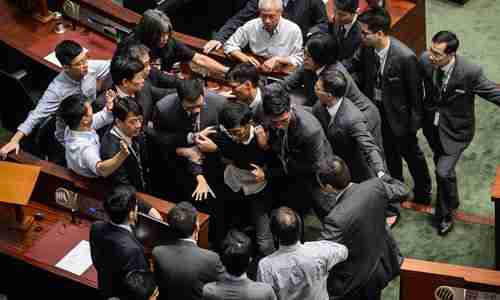 |
Hong Kong's legislative election on September 4 handed Beijing a stinging defeat, as pro-democracy or "localist" candidates won 27 out of 70 seats for the Legislative Council of Hong Kong (LegCo). There was little doubt at the time that this would substantially exacerbate the level of tension between Hong Kong and Beijing, and now, we're seeing the first results.
Hong Kong's LegCo has been in chaos for almost a month, thanks to two newly elected lawmakers, Yau Wai-ching and Sixtus Baggio Leung Chun-hang, from "Youngspiration" who have gone beyond "pro-democracy" to advocating full Hong Kong independence from China.
When they took their oaths of office on October 12, they changed the wording of the official oath of office to express support for Hong Kong's independence, and to describe China using a derogatory term. Their oaths were invalidated, and since then, pro-Beijing legislators have been staging walkouts and using other parliamentary tricks to keep them from being seated at all.
Anticipating trouble on Wednesday, the LegCo president moved the council's meeting from the main chamber to a conference room. The two localists responded by storming into the conference room and demanded to take their oaths of office and be seated. They were forcibly ejected by security personnel.
The two localists will appear in a Hong Kong court on Thursday, and there are a couple of outcomes that would be extremely controversial:
There is a growing reality with both Taiwan and Hong Kong. Mainland China's government in Hong Kong has been using a carrot and stick approach with both entities for years, hoping that the people would eventually fall in love with Beijing and want to be government by Beijing. This hope is extremely delusional, of course, but being delusional is China's only path other than full-scale invasions of both entities to bring them under control.
For both Hong Kong and Taiwan, the generations of survivors of World War II and Mao's Communist Revolution have taken steps to encourage unification with Beijing, or at least to avoid angering Beijing. But it's increasingly clear to everyone that younger generations are increasingly hostile to Beijing.
This means that there is no advantage to Beijing to waiting. Taiwan and Hong Kong will increasingly want independence. Furthermore, as we've seen with Hong Kong's Umbrella Revolution and Taiwan's Sunflower Movement, independence movements in Taiwan and Hong Kong feed off of each other, and support each other, and may even have synergy with independence movements in Tibet (by Buddhists) or Xinjiang (by Uighurs). Beijing has already said that that it will violently crush anyone who even talks about "independence." This is a continually worsening situation that Beijing is certain to find increasingly dangerous, enough to trigger a violent reaction at some point. South China Morning Post (Hong Kong) and BBC and Global Times (Beijing)
Related Articles
Under pressure from South Korea, Sudan has ended all military cooperation and diplomatic connections with North Korea. According to a statement posted by South Korea's Ministry of Foreign Affairs:
"[Foreign Minister Ibrahim Ghandour of Sudan] mentioned that Sudan has completely cut off its military cooperation with North Korea, has no North Korean diplomatic missions in the country as well as no diplomatic missions of its own in the North, and has no plans for high-level exchanges. The Minister, calling nuclear weapons an obstacle to peace and security, stressed that Sudan is thoroughly implementing UN Security Council sanctions resolutions on North Korea."
Sudan is the third African country this year to declare that it would comply with UN sanctions against North Korea. Uganda announced in July that it would several military and security ties with North Korea, and this was followed by a decision of Namibia to oust two North Korean firms that were constructing an arms and munition factory in nation’s capital, Windhoek.
Other African countries are maintaining ties with North Korea. These include Angola, DR Congo, Zimbabwe, Burundi, and Equatorial Guinea -- also countries that are themselves targets of UN sanctions. N. Korea News and S. Korea Ministry of Foreign Affairs and NK News (7/28)
(Comments: For reader comments, questions and discussion, see the 3-Nov-16 World View -- Hong Kong legislature in chaos, under threat of intervention by mainland China thread of the Generational Dynamics forum. Comments may be
posted anonymously.)
(3-Nov-2016)
Permanent Link
Receive daily World View columns by e-mail
Donate to Generational Dynamics via PayPal
Wife of North Korea's child dictator Kim Jong-un has disappeared
by John J. Xenakis
This morning's key headlines from GenerationalDynamics.com
 |
After the pretty Ri Sol-ju married North Korea's child dictator Kim Jong-un in 2012, they were often seen together in tours of factories, hospitals and parks. But now Ri has not been seen in public since March 28, and there's speculation that something has happened to her.
There are several theories:
Related Articles
Protests have continued across Morocco for a fourth day on Tuesday over the death of Mouhcine Fikri, a fishmonger, crushed by a garbage truck.
The story is this: It's apparently illegal to sell swordfish in Morocco at this time, but Fikri was selling swordfish anyway, after purchasing it at the port in the town of Al Hoceima in northern Morocco. A policeman confiscated his swordfish, reportedly worth about $11,000, and threw it into a garbage truck. Fikri jumped into the garbage truck to retrieve his fish, and he was crushed to death by the garbage truck. Some people who were present claim that the policeman told the garbage truck driver to crush him on purpose, though the police deny this.
The picture of Fikri being crushed went viral on social media, and triggered anti-government protests across the country. On Tuesday, the government announced the arrests of 11 people, in an attempt to stop the protests.
The "Arab Spring" has been roiling the Arab countries since 2011, when a new generation of Arabs came of age and began protesting across the entire Mideast.
The Arab Spring uprisings were triggered on December 17, 2010, when a street vendor, Mohamed Bouazizi set fire to himself in Sidi Bouzid in central Tunisia, in protest of the police confiscation of his vegetable cart. After days of clashes between protesters and the police, long-time dictator Zine El Abidine Ben Ali was forced to flee the country to exile in Saudi Arabia. By January 2011, the clashes had spread to Egypt, Libya, Yemen, and Lebanon, launching the Arab Spring.
Morocco is a Muslim country, but it has largely escaped the chaos of the Arab Spring, mainly because it's historically been ethnically Berber rather than Arab, putting it on a slightly different generational timeline, despite some Arab-Berber intermarriage.
Some analysts are comparing the death of Moroccan fishmonger Mouhcine Fikri to the death of Tunisian street vendor Mohamed Bouazizi, and suggesting that Morocco might be about to undergo the same kind of chaos as the countries of the Arab Spring. From the point of view of Generational Dynamics, one can safely predict that Morocco is headed for that chaos, but whether it's happening now or next year or the year after cannot be predicted.
Al Hoceima is in the Rif region of northern Morocco, with a population of about 55,000. The region was the heart of of the revolt against the Spanish colonists during the 1920s, and was the scene of a popular insurrection in 1958. Daily Sabah (Ankara) and Al Jazeera and Quartz and Telegramme.info
Related Articles
(Comments: For reader comments, questions and discussion, see the 2-Nov-16 World View -- Protests across Morocco after horrific death of fishmonger in garbage truck thread of the Generational Dynamics forum. Comments may be
posted anonymously.)
(2-Nov-2016)
Permanent Link
Receive daily World View columns by e-mail
Donate to Generational Dynamics via PayPal
Widespread dissatisfaction with UN peacekeeping force MINUSCA
by John J. Xenakis
This morning's key headlines from GenerationalDynamics.com
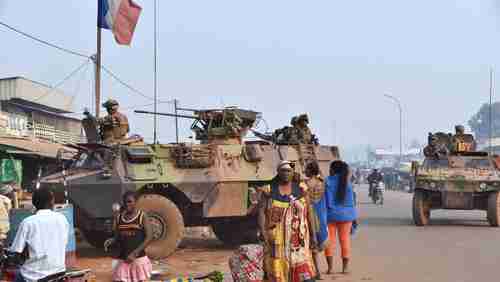 |
France on Monday formally ended its peacekeeping mission in Central African Republic. Using an old trick to "just declare victory and go home," France hailed it as a success even though it's been pretty much a total failure, as violence in the country's civil war has continued in recent months and even surged.
The French mission, known as Sangaris, was launched in December 2013, and was supposed to last for six months, until a United Nations force could take over. The UN force is known as MINUSCA, which stands for Multidimensional Integrated Stabilization Mission in the Central African Republic. The French force had 2,500 troops at its peak, and MINUSCA has about 12,000 troops.
The CAR sectarian war began in March 2013, when François Bozizé, the Christian former president of CAR, was ousted in a coup in March 2013 by Michel Djotodia, a Muslim, who became president and served until January 2014.
After Djotodia's coup took place in March 2013, Muslim Seleka militias began committing atrocities, particularly targeting the Christian constituencies of the deposed François Bozizé. In December 2013, French Foreign Legion peacekeeping troops arrived to disarm the Seleka militias.
The actions of the French troops backfired. When the Muslim Seleka troops were disarmed, the Christian anti-balaka militias "rushed into the vacuum," and began committing atrocities in 2014, for revenge against the Selekas. Since then, both Christians and Muslims have been committing atrocities, and it's become a full-scale generational crisis war. Thousands have been killed, and millions have been displaced.
As I've explained in the past, CAR's last generational crisis war was the 1928-1931 Kongo-Wara Rebellion ("War of the Hoe Handle"), which was a very long time ago, putting CAR today deep into a generational Crisis era, where a new crisis civil war has already started.
France's defense minister Jean-Yves Le Drian announced the withdrawal of the French troops, saying that MINUSCA is now ready to take full responsibility for the peacekeeping operation.
A prominent CAR official, Anicet Georges Dologuele, said that Le Drian was wrong:
"Sangaris is pulling out far too early. Our security forces are not ready to take over. The UN forces are more and more overwhelmed."
Le Drian was unsympathetic:
"It's always too early. These responsibilities are above all your own."
There are still numerous armed groups fighting in CAR. The main ones are the Muslim former Seleka force, and the Christian "anti-Balaka" militias, a reference to the machetes used by the Selekas. There are also vigilante groups made up of nomadic, predominantly Muslim Fulani herders, as well as others specializing in highway robbery.
Both the French forces and the MINUSCA forces have mainly been doing their "peacekeeping" in the region around the country's capital city Bangui. But CAR is a huge country, and much of the country has not been affected by "peacekeeping" at all. Thus there continues to be fighting among armed groups across the country.
Since the armed militias are reported to fear the French forces more than the MINUSCA forces, there are concerns that the withdrawal of the French forces will trigger a major surge in new violence. France 24 and Deutsche Welle
Related Articles
During the past 18 months, there have been scores of allegations of child rape and other sexual abuse by MINUSCA's peacekeepers, though French troops have faced similar accusations.
Roland Marchal, of the National Center for Scientific Research (CNRS) in Paris, speaking on RFI, agreed that MINUSCA is not ready to take full responsibility for the peacekeeping operation, because they fail to act decisively, "they find an explanation not to move too quickly, not to move to the neighborhoods, and they procrastinate on making difficult decisions." He says that this sends a wrong message to the CAR population, who feel that MINUSCA is not doing its job. "The crisis is deep, it's structural, it's systemic, so you have to make radical decisions, to integrate more the countryside," and neither MINUSCA nor the government is willing to do that.
Marchal added that the French troops were not able to fulfill their mandate either, although they were there for three years. "Their mandate was to disarm armed groups, and have the country move to national reconciliation. But it became clear that disarming the armed groups would actually be a very hard task, and costly, and second, to undertake drastic reforms in car you need a legitimate government."
From the point of view of Generational Dynamics, this is exactly what is to be expected, as I've been writing since 2013 when the crisis began. CAR is in a generational crisis war, and a generational crisis war does not end until there's an "explosive climax," something so horrific that both sides decide to stop fighting. This could be a real "explosion," such as the nuking of Japan that ended World War II, or it could be a massive act of genocide. Whatever it is, it must be so bad that it will be remembered for decades or even centuries, and will convince the survivors that it must "never again" be allowed to happen -- and it doesn't happen again, as long as the survivors are alive.
We're seeing the same kind of situation in Africa's other generational crisis war -- the Darfur war. It's a similar story. In 2007, the a UN Security Council resolution established the United Nations–African Union Mission in Darfur (UNAMID), and provided peacekeeping troops to protect the Darfurians. Millions of people who were threatened with violence were moved from their villages to camps for refugees and IDPs (internally displaced persons) controlled by UNAMID. Today, there are still more than 3.1 million IDPs living in these refugee camps, and they are still suffering from hunger, thirst, and attacks from the militias that were attacking them ten years ago. Once again, the Darfur war will not end until there's a "explosive climax," a massive act of genocide that will convince all the survivors to stop fighting. Until then, the war goes on. RFI (Paris) and Al Jazeera
Related Articles
(Comments: For reader comments, questions and discussion, see the 1-Nov-16 World View -- France pulls out of Central African Republic as sectarian violence grows thread of the Generational Dynamics forum. Comments may be
posted anonymously.)
(1-Nov-2016)
Permanent Link
Receive daily World View columns by e-mail
Donate to Generational Dynamics via PayPal
Web Log Summary - 2017
Web Log Summary - 2016
Web Log Summary - 2015
Web Log Summary - 2014
Web Log Summary - 2013
Web Log Summary - 2012
Web Log Summary - 2011
Web Log Summary - 2010
Web Log Summary - 2009
Web Log Summary - 2008
Web Log Summary - 2007
Web Log Summary - 2006
Web Log Summary - 2005
Web Log Summary - 2004
Web Log - December, 2017
Web Log - November, 2017
Web Log - October, 2017
Web Log - September, 2017
Web Log - August, 2017
Web Log - July, 2017
Web Log - June, 2017
Web Log - May, 2017
Web Log - April, 2017
Web Log - March, 2017
Web Log - February, 2017
Web Log - January, 2017
Web Log - December, 2016
Web Log - November, 2016
Web Log - October, 2016
Web Log - September, 2016
Web Log - August, 2016
Web Log - July, 2016
Web Log - June, 2016
Web Log - May, 2016
Web Log - April, 2016
Web Log - March, 2016
Web Log - February, 2016
Web Log - January, 2016
Web Log - December, 2015
Web Log - November, 2015
Web Log - October, 2015
Web Log - September, 2015
Web Log - August, 2015
Web Log - July, 2015
Web Log - June, 2015
Web Log - May, 2015
Web Log - April, 2015
Web Log - March, 2015
Web Log - February, 2015
Web Log - January, 2015
Web Log - December, 2014
Web Log - November, 2014
Web Log - October, 2014
Web Log - September, 2014
Web Log - August, 2014
Web Log - July, 2014
Web Log - June, 2014
Web Log - May, 2014
Web Log - April, 2014
Web Log - March, 2014
Web Log - February, 2014
Web Log - January, 2014
Web Log - December, 2013
Web Log - November, 2013
Web Log - October, 2013
Web Log - September, 2013
Web Log - August, 2013
Web Log - July, 2013
Web Log - June, 2013
Web Log - May, 2013
Web Log - April, 2013
Web Log - March, 2013
Web Log - February, 2013
Web Log - January, 2013
Web Log - December, 2012
Web Log - November, 2012
Web Log - October, 2012
Web Log - September, 2012
Web Log - August, 2012
Web Log - July, 2012
Web Log - June, 2012
Web Log - May, 2012
Web Log - April, 2012
Web Log - March, 2012
Web Log - February, 2012
Web Log - January, 2012
Web Log - December, 2011
Web Log - November, 2011
Web Log - October, 2011
Web Log - September, 2011
Web Log - August, 2011
Web Log - July, 2011
Web Log - June, 2011
Web Log - May, 2011
Web Log - April, 2011
Web Log - March, 2011
Web Log - February, 2011
Web Log - January, 2011
Web Log - December, 2010
Web Log - November, 2010
Web Log - October, 2010
Web Log - September, 2010
Web Log - August, 2010
Web Log - July, 2010
Web Log - June, 2010
Web Log - May, 2010
Web Log - April, 2010
Web Log - March, 2010
Web Log - February, 2010
Web Log - January, 2010
Web Log - December, 2009
Web Log - November, 2009
Web Log - October, 2009
Web Log - September, 2009
Web Log - August, 2009
Web Log - July, 2009
Web Log - June, 2009
Web Log - May, 2009
Web Log - April, 2009
Web Log - March, 2009
Web Log - February, 2009
Web Log - January, 2009
Web Log - December, 2008
Web Log - November, 2008
Web Log - October, 2008
Web Log - September, 2008
Web Log - August, 2008
Web Log - July, 2008
Web Log - June, 2008
Web Log - May, 2008
Web Log - April, 2008
Web Log - March, 2008
Web Log - February, 2008
Web Log - January, 2008
Web Log - December, 2007
Web Log - November, 2007
Web Log - October, 2007
Web Log - September, 2007
Web Log - August, 2007
Web Log - July, 2007
Web Log - June, 2007
Web Log - May, 2007
Web Log - April, 2007
Web Log - March, 2007
Web Log - February, 2007
Web Log - January, 2007
Web Log - December, 2006
Web Log - November, 2006
Web Log - October, 2006
Web Log - September, 2006
Web Log - August, 2006
Web Log - July, 2006
Web Log - June, 2006
Web Log - May, 2006
Web Log - April, 2006
Web Log - March, 2006
Web Log - February, 2006
Web Log - January, 2006
Web Log - December, 2005
Web Log - November, 2005
Web Log - October, 2005
Web Log - September, 2005
Web Log - August, 2005
Web Log - July, 2005
Web Log - June, 2005
Web Log - May, 2005
Web Log - April, 2005
Web Log - March, 2005
Web Log - February, 2005
Web Log - January, 2005
Web Log - December, 2004
Web Log - November, 2004
Web Log - October, 2004
Web Log - September, 2004
Web Log - August, 2004
Web Log - July, 2004
Web Log - June, 2004